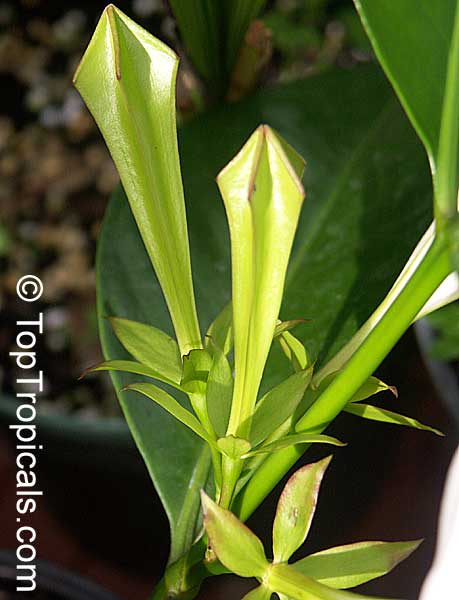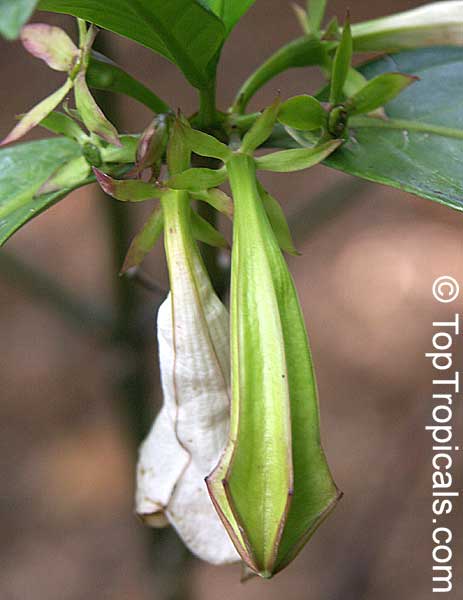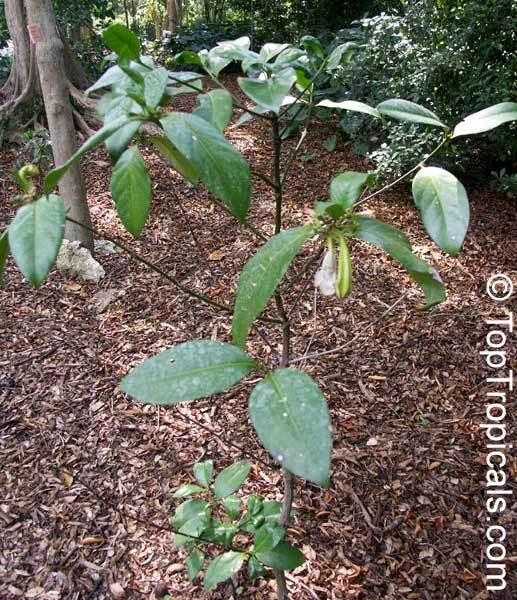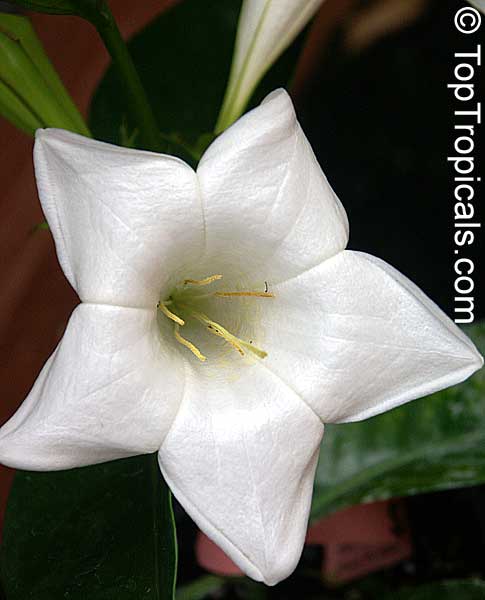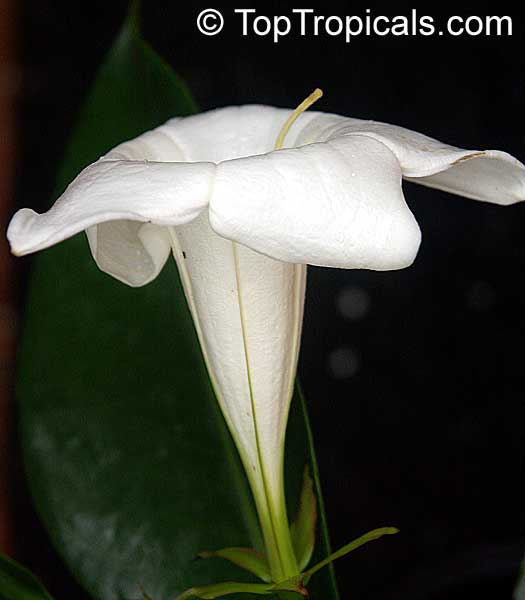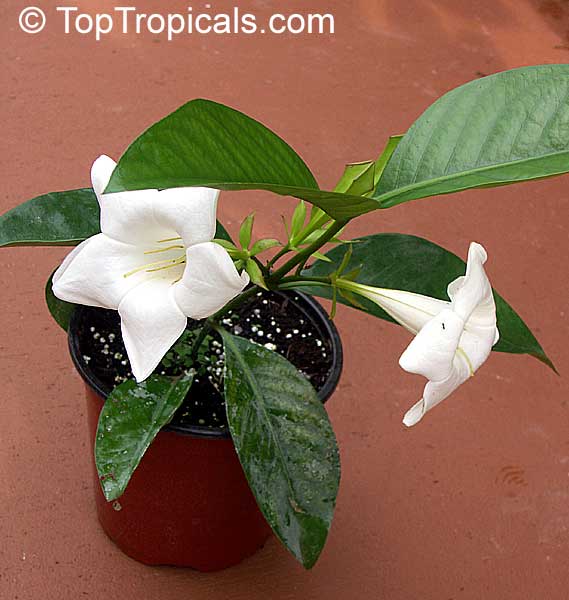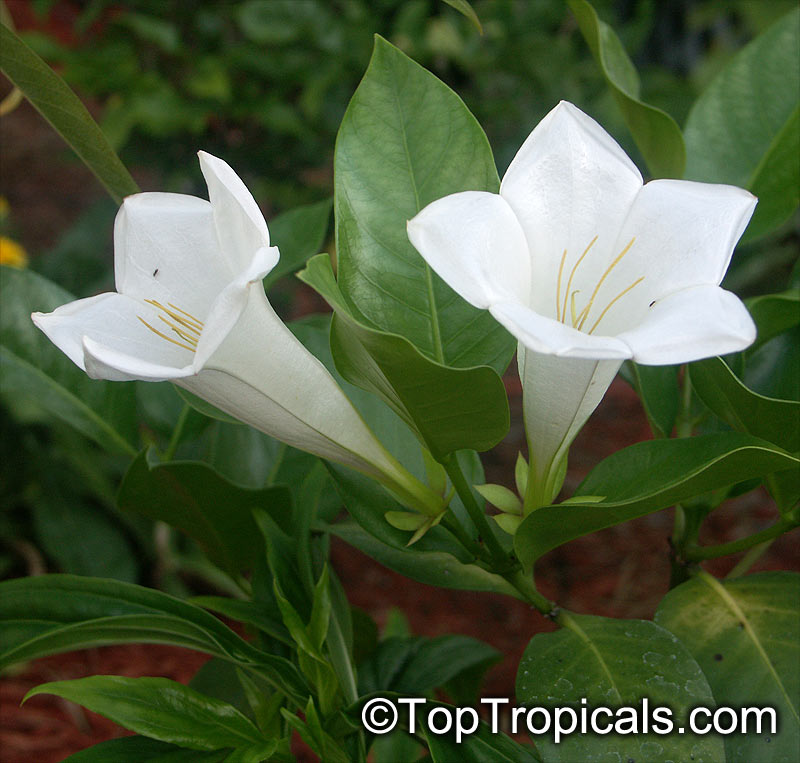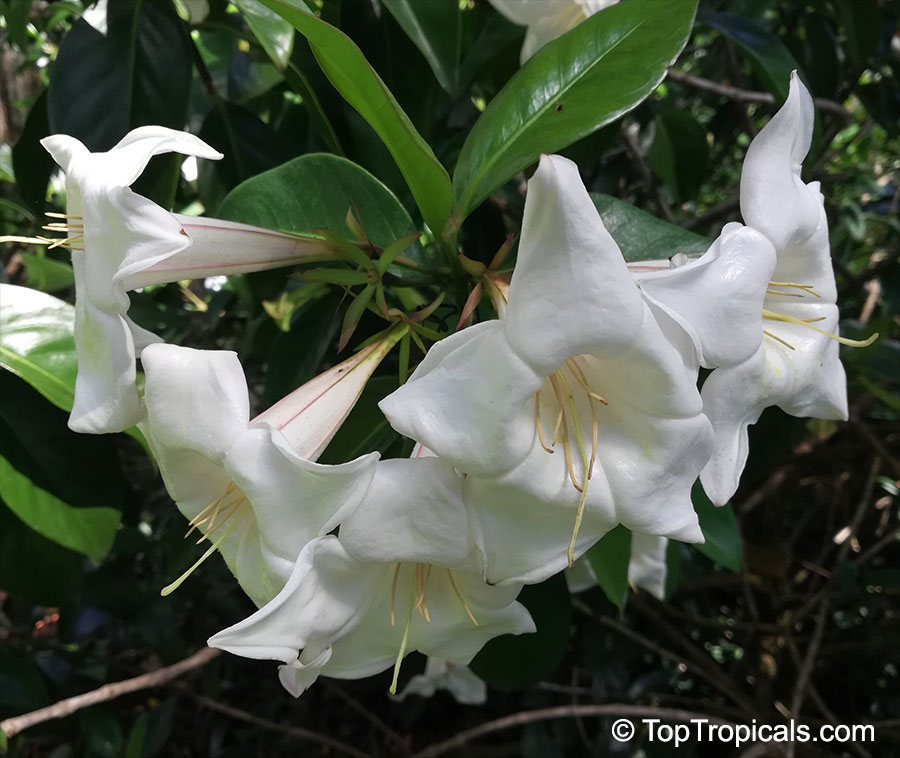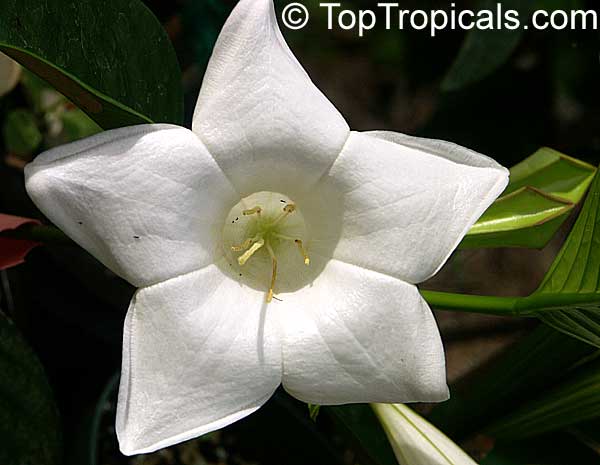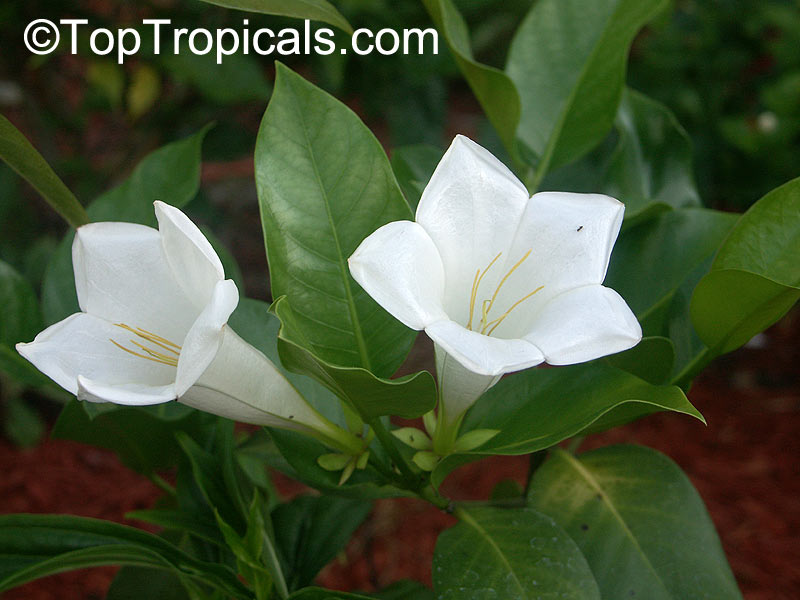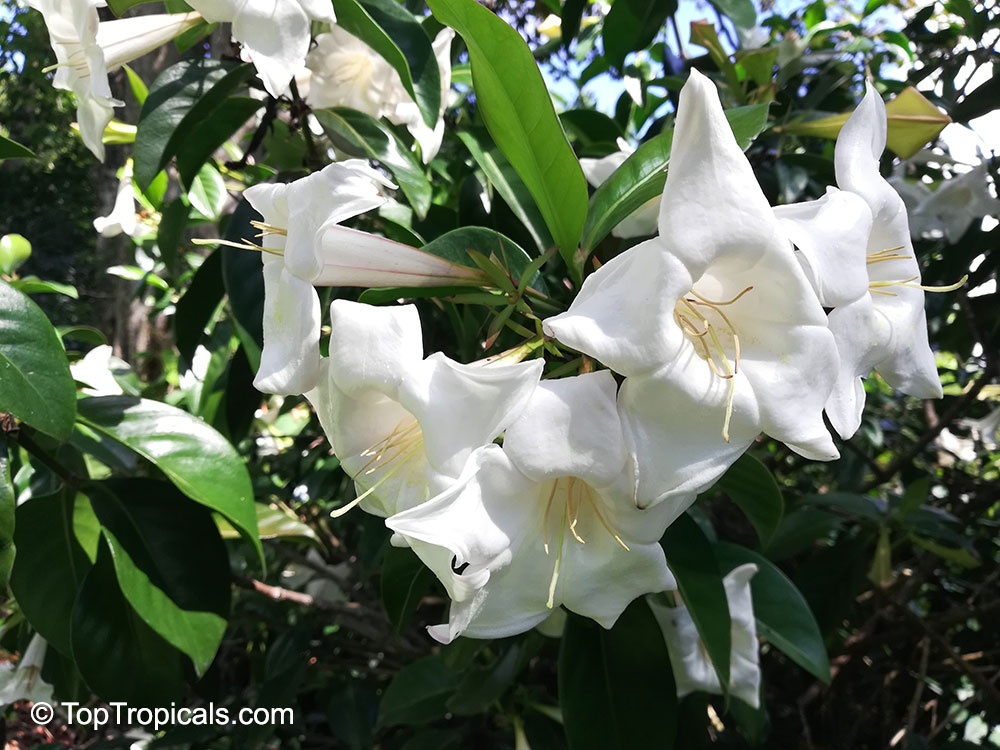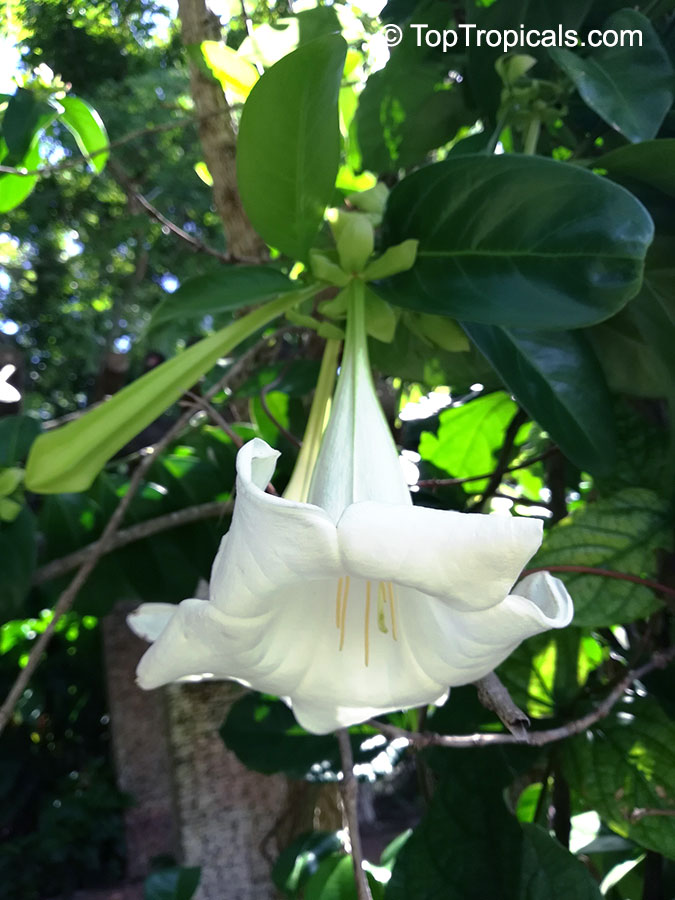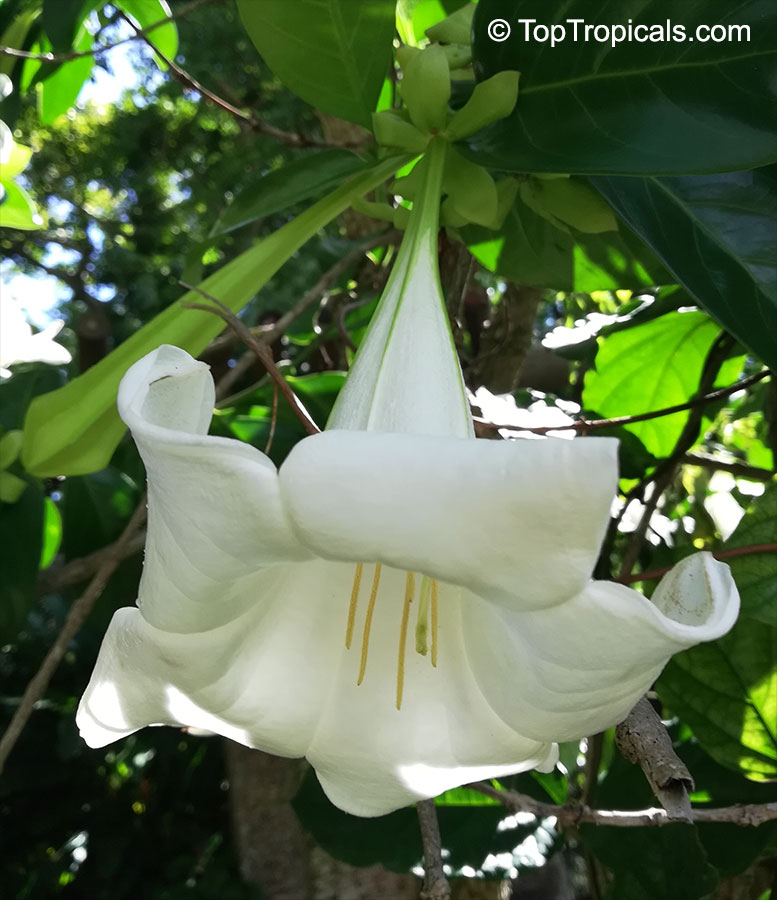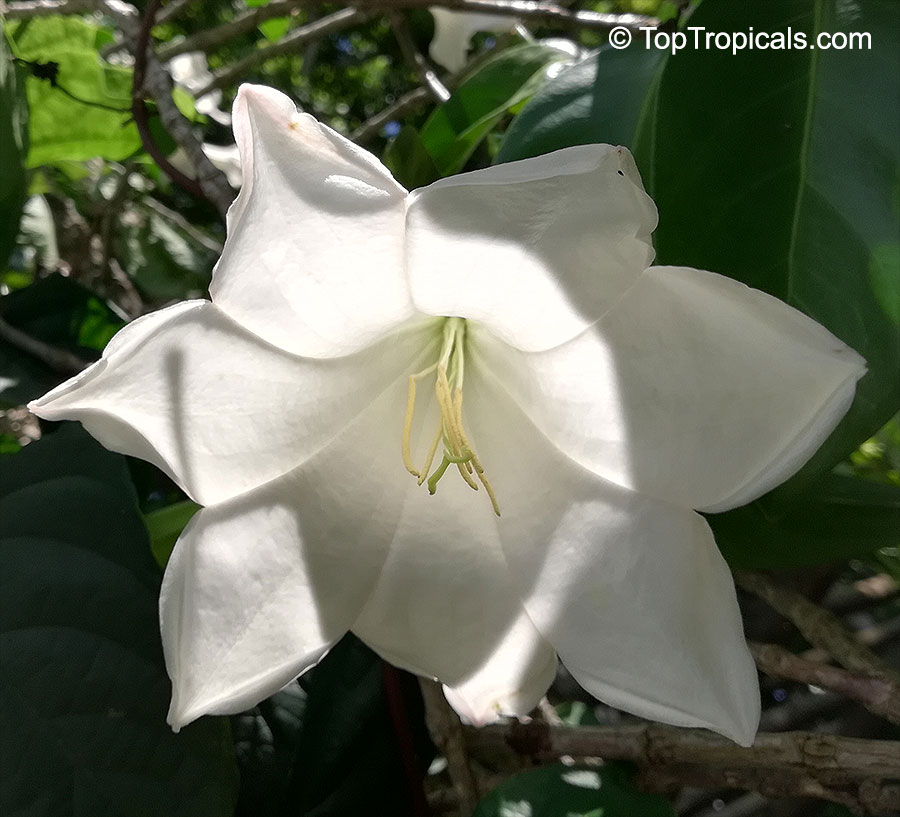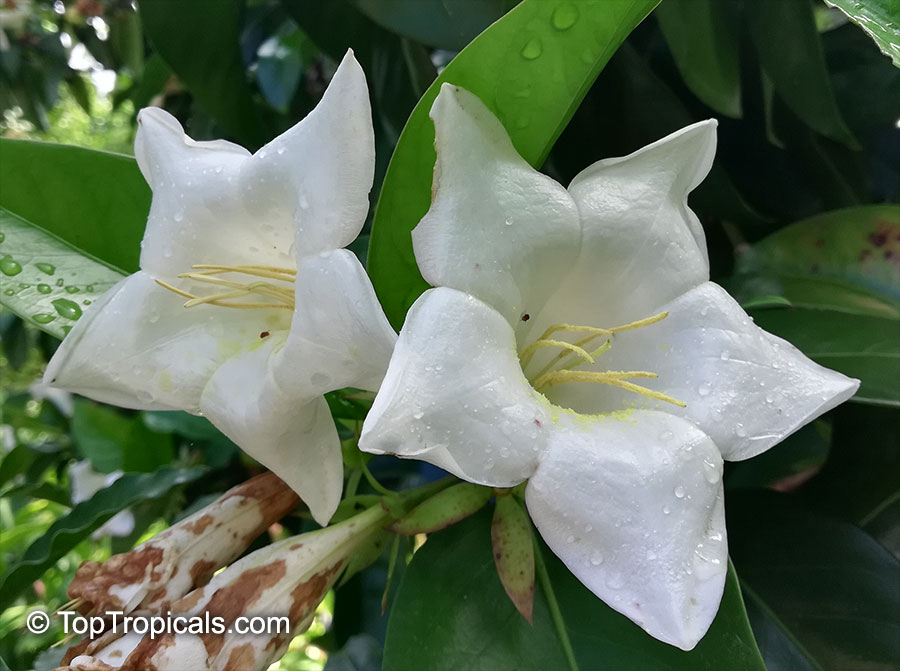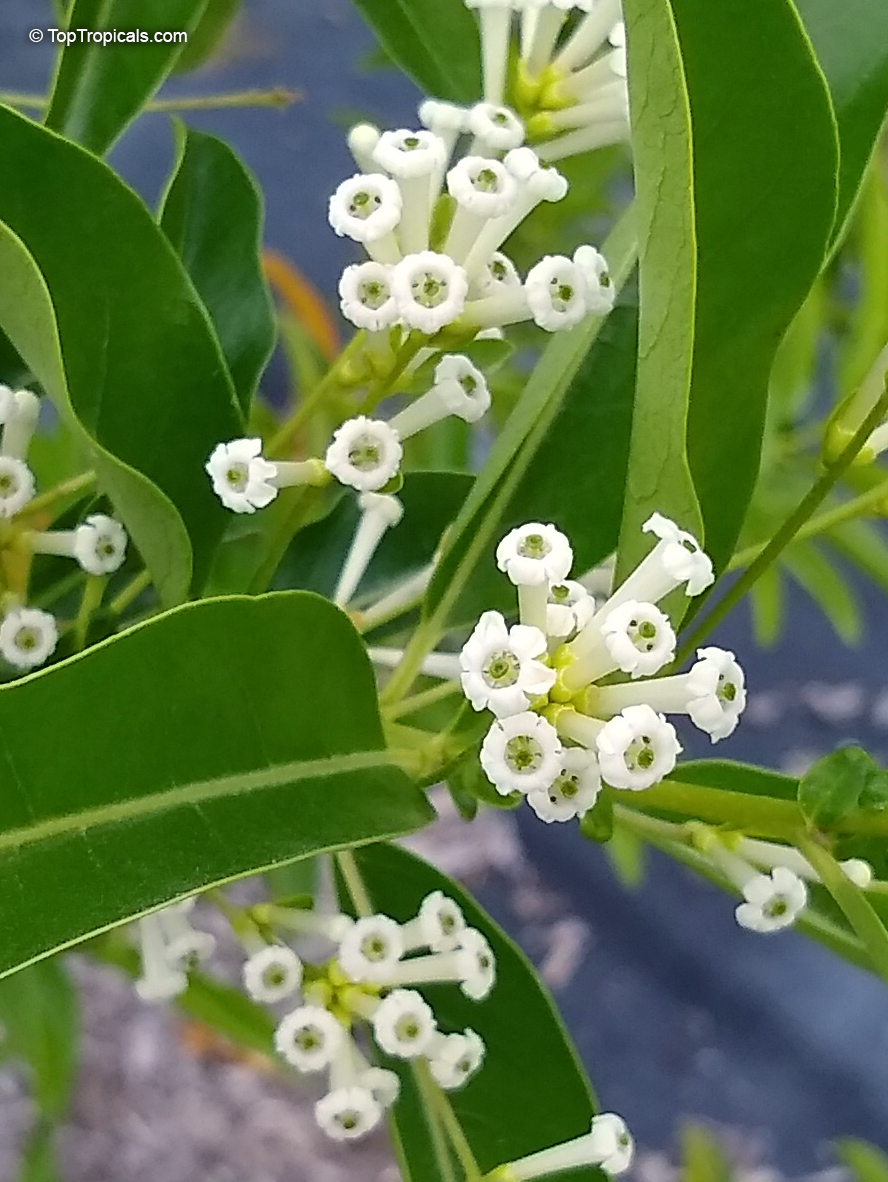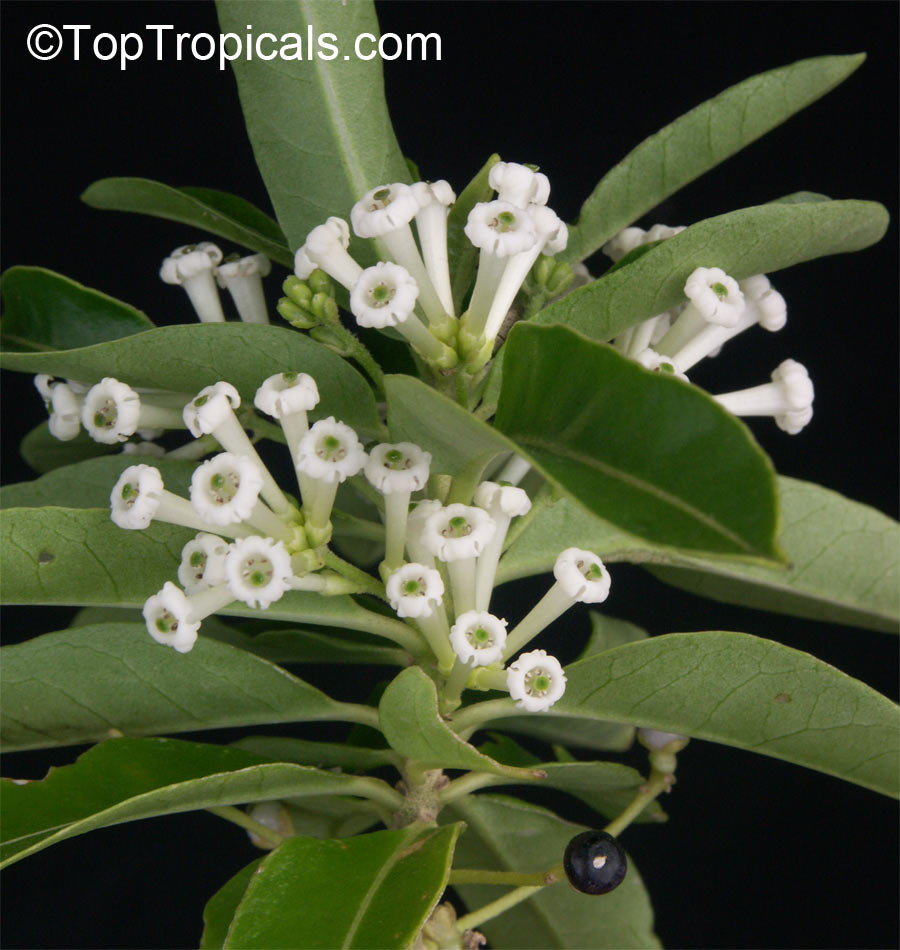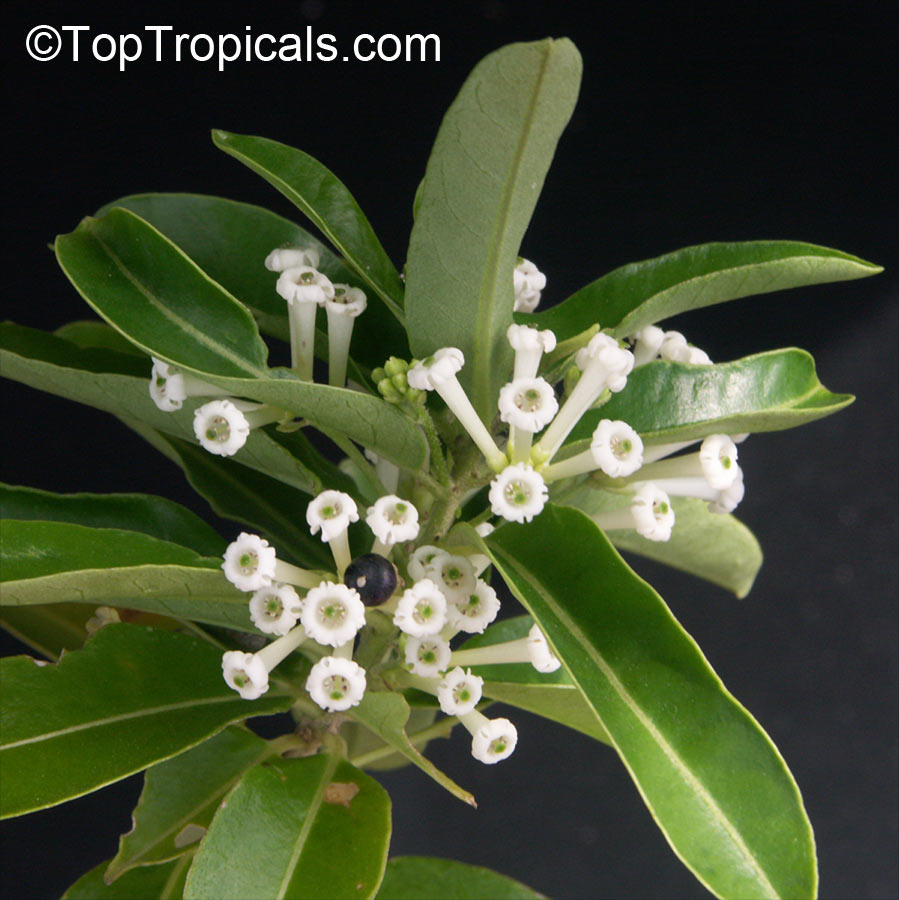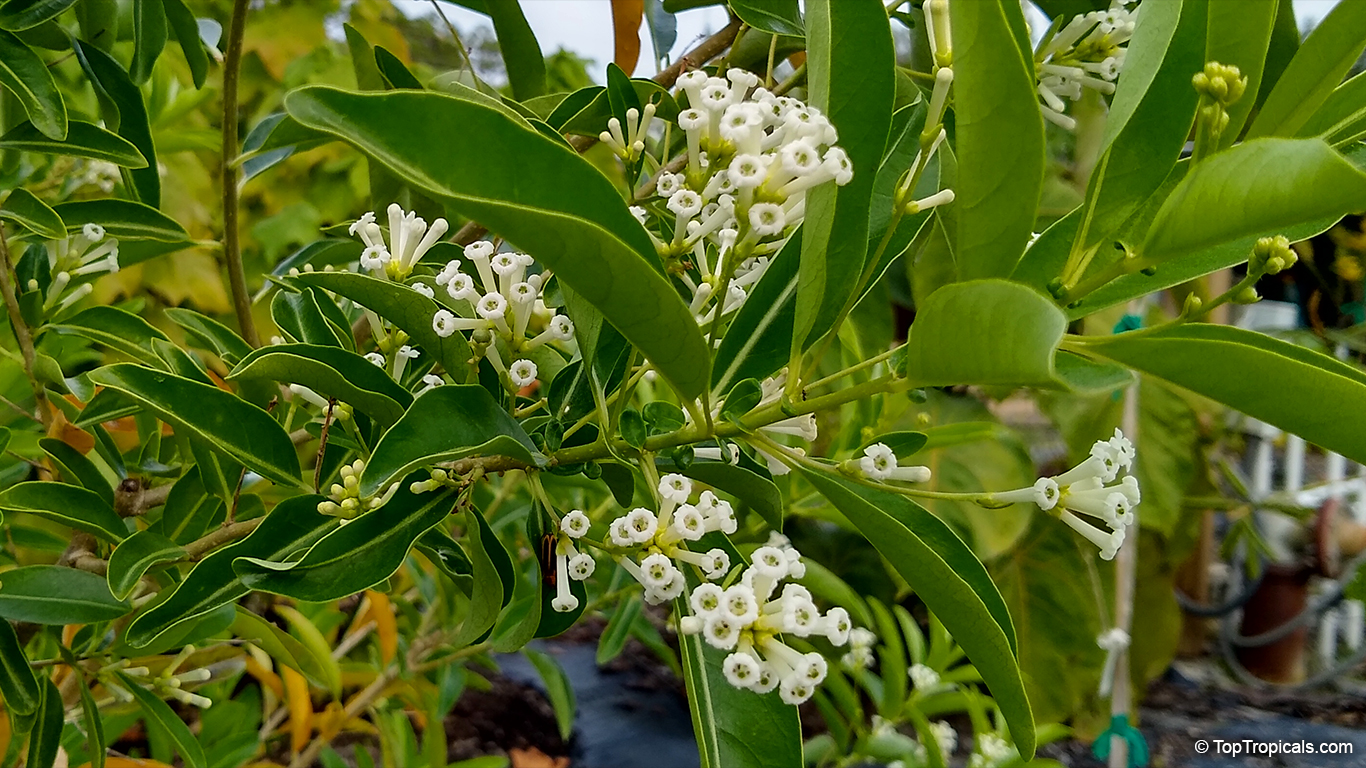Portlandia - Plant Encyclopedia Results
Top Tropicals Plant Encyclopedia
| Number of plants found: 7 |
Botanical names: Cubanola domingensis, Portlandia domingensis
Common names: Cubanola, Tree Lily, Campanita Criolla
Family: Rubiaceae
Origin: Cuba, Jamaica







Cubanola, also known as Portlandia, is a slow-growing small tree that is native to Cuba and is known for its attractive off-white, greenish, trumpet-shaped flowers that have a fragrance reminiscent of warm chocolate. This plant is suitable for growing in hardiness zones 9-11 and prefers filtered light, although it can also be grown in full sun, which will result in more profuse flowering but smaller leaves. The leaves of the Cubanola plant are silvery-green and shiny, and it is important to water the plant regularly but avoid overwatering and ensure that the soil is loose and well-drained. This plant grows slowly, adding about 4-5 inches per year, and may initially grow as a tall single stem before filling out and becoming more shrub-like with age.
Cubanola plant is cold sensitive and should be planted with protection from winter winds in order to prevent the leaves from dropping and the plant from being knocked to the ground by severe cold. However, with proper care, the plant should recover from cold temperatures. The Cubanola plant is an excellent choice for attracting pollinators such as hummingbirds and butterflies, and its fragrant flowers last from late spring through the fall, adding beautiful color to the garden.
In colder climates, it is a good idea to plant the Cubanola in a pot so that it can be moved inside during the cold winter months. When planting, mix in some grit or sharp sand and place the plant in partial sun. Keep in mind that the roots will fill the container within a few years and you may need to repot the plant into a larger pot. Fertilize the root ball in early spring with a balanced fertilizer to promote healthy growth. This large shrub or small tree is easy to care for and will surely brighten up any landscape with its attractive flowers. Don't wait - plant Cubanola today and let it bring beauty to your doorstep!
Botanical name: Portlandia albiflora
Common names: White Horse Flower, Tree Lily
Family: Rubiaceae
Origin: Jamaica







Portlandia albiflora is a large shrub of up to 5-10 feet tall, it is native to Jamaica and can be grown in USDA zones 9-11. It can flourish in full sun or semi-shade, that means it is not necessary to provide full sun in hot regions.
Regular watering is essential for it to grow at an optimal rate and prevent potential problems like mildew caused by dryness. The white, off-white flowers give that Caribbean vibe to a garden, being highly fragrant and attractive to butterflies and hummingbirds, adding an extra bit of beauty.
The Portlandia albiflora is easy to grow in pots, even in cold regions. Indoors the pot should be placed in a bright daylight spot out of direct sunlight. Water when the soil is dry to keep the soil humid, fertilizer is not necessary since it is a slow grower. Use a well-drained soil and consider using a soil additives like perlite or peat, this helps to maintain the right levels of dampness.
Outdoors it should have full or semi-shade, avoid planting it directly in full sun, this tree needs regular watering while it establishes itself, when firmly rooted weekly watering will suffice. Mulch around the plant can be used to keep the soil moist and help retain heat. If in a cold region during the winter, use a blanket to protect the roots from frost.
Overall, Portlandia albiflora is an eye-catching, fragrant but slow-growing tree native to Jamaica. It needs regular water, fertilizer is not necessary, can live in full sun or semi-shade and needs protection in cold regions. It gives that Caribbean vibe to any garden, attracting butterflies and hummingbirds with its white, off-white flowers. Show it love and it will give you beauty and a bit of Jamaica in return.
Botanical name: Portlandia coccinea
Common names: Pink Bell Flower, Tree Lily
Family: Rubiaceae
Origin: Carribean







Shrubs or small trees. Leaves opposite, long or short-petiolate, subsessil or sessil; blades ovate, broadly ovate, narrowly elliptic, elliptic, broadly elliptic, obovate to rotundate, stiffly chartaceous, papyraceous, thinly coriaceous or thickly coriaceous. Inflorescence axillary, cymose, pauciflorous or uniflorous. Flowers bisexual, protandrous. Corolla narrowly campanulate, narrowly or broadly infundibuliform, actinomorphic, white to cream-white, pinkish-white, pink or red; tube externally glabrous, internally glabrous, without a pubescent ring inside. Stamens alternate to the corolla lobes, partially exserted. Fruit a loculicidal capsule, dehiscing basipetally, thinly woody. Seeds horizontal, medium-sized, 3-5-angular.
Endemic to Jamaica, all species extremely rare in their natural environment. Some of the species are sometimes cultivated in local gardens for their large, ornamental flowers.
Botanical name: Portlandia grandiflora
Common names: Bell Flower, Glorious Flower of Cuba, White Horse Flower, Tree Lily
Family: Rubiaceae
Origin: Cuba, Jamaica







The plant is named after a former Duchess of Portland, originally discovered in the island some centuries ago but had been in decline until Jamaicas National Arboretum Foundation at Hope Gardens began propagating them a few years ago. A slow growing small tree that produces 5-6" white, trumpet, fragrant flowers. In nature mature trees have been reported to grow 15 feet. Since it is very slow growing, it stays in container as a small 3-5" plant, and blooms when in young age. This plant has elliptic, leathery leaves and blooms from late Spring into Fall. The flowers are white tinged with pink and trumpet-shaped. The air is filled with their luscious perfume, reminiscent of warm, creamy chocolate. It is most fragrant in the evening and early morning, but can be appreciated most any time. Grows in wild in limestone or karst areas of Jamaica. Dark green, lush foliage contrasts beautifully with the white flowers. Initially the shrub grows on a tall single stem so it has the look of a standard or lollipop. Gradually, with age, it fills out and becomes more shrub-like. Given its native habitat, portlandia does well in alkaline soils. It is cold sensitive, and should be planted with protection from winter winds. Cold may cause leaves to drop and severe cold may knock it back to the ground, but it will spring back. While it can be grown in a container, it flowers much of the year if it is in the ground. One of very few tropical plants that tolerate alkaline soils!
Recommended Fertilizer: SUNSHINE Pikake - Fragrant Flower Booster
Botanical names: Portlandia platantha, Portlandia latifolia
Common names: Dwarf Bell Flower, White horse flower, Tree Lily
Family: Rubiaceae
Origin: Jamaica








This very rare variety of Portlandia has a drarf growth habit. It is slow growing and stays inder 3-4 ft in a pot and 5-6 in the ground. The flowers are 4-5" long, white tinged with pink and trumpet-shaped. The air is filled with their luscious perfume, reminiscent of warm, creamy chocolate. The plant is named after a former Duchess of Portland, originally discovered in the island some centuries ago but had been in decline until Jamaicas National Arboretum Foundation at Hope Gardens began propagating them a few years ago. A slow growing small tree that produces white, trumpet, fragrant flowers. This plant has elliptic, leathery leaves and blooms from late Spring into Fall. It is most fragrant in the evening and early morning, but can be appreciated most any time. Dark green, lush foliage contrasts beautifully with the white flowers. Initially the shrub grows on a tall single stem so it has the look of a standard or lollipop. Gradually, with age, it fills out and becomes more shrub-like. Given its native habitat, portlandia does well in alkaline soils. It is cold sensitive, and should be planted with protection from winter winds. Cold may cause leaves to drop and severe cold may knock it back to the ground, but it will spring back. While it can be grown in a container, it flowers much of the year if it is in the ground.
Botanical name: Cestrum diurnum
Common names: White Chocolate Jasmine, Inkberry, Day Jessamine, Day Blooming Jasmine, China Berry
Family: Solanaceae
Origin: Tropical America








Unlike cestrum nocturnum, this one is most fragrant during the day: flowers have very strong chocolate scent, as good as fragrance of famous Portlandia. It is a glabrous branching shrub to 8ft tall with fragrant white five-petaled elongated flowers
Recommended Fertilizer: SUNSHINE Pikake - Fragrant Flower Booster
Use link to repeat this search:
https://toptropicals.com/cgi-bin/garden_catalog/cat.cgi?find=portlandia&search_op=and&keyword_op=and&language=e&number=10
&no_change_lang=1&user=tt&sale=1&first=0
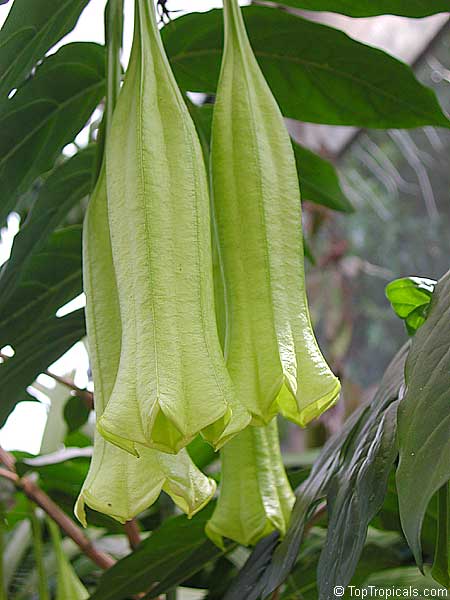
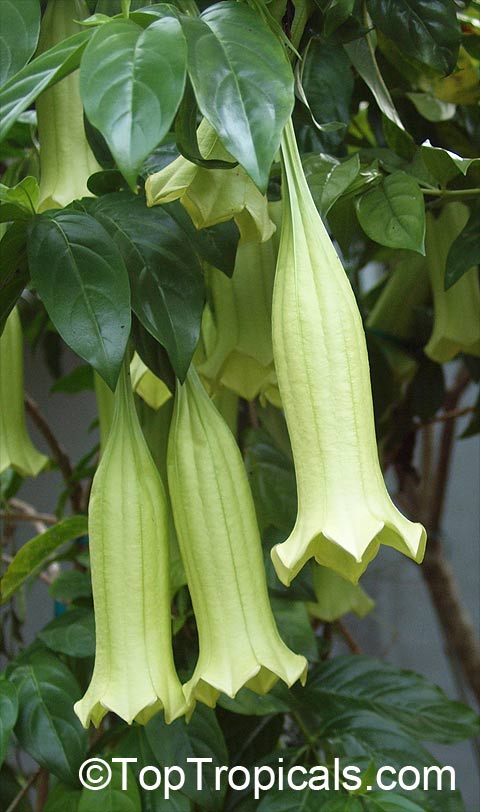
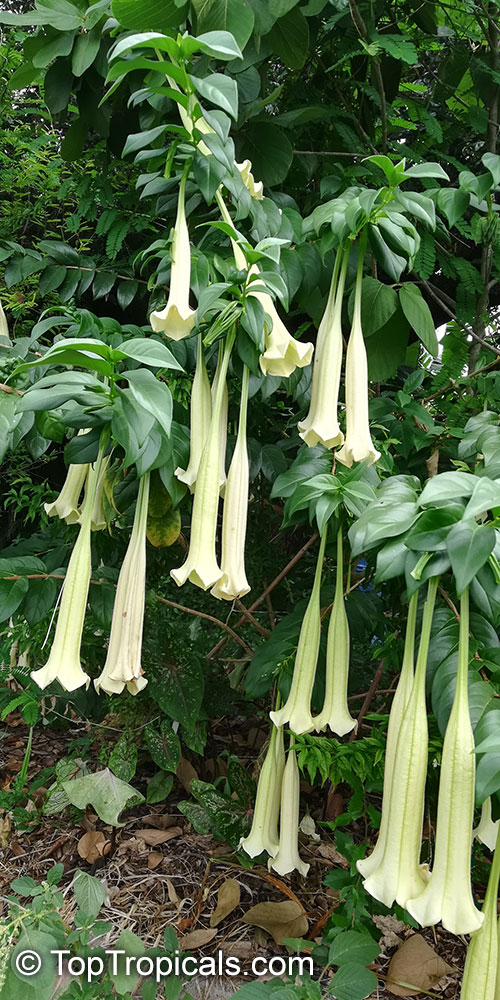
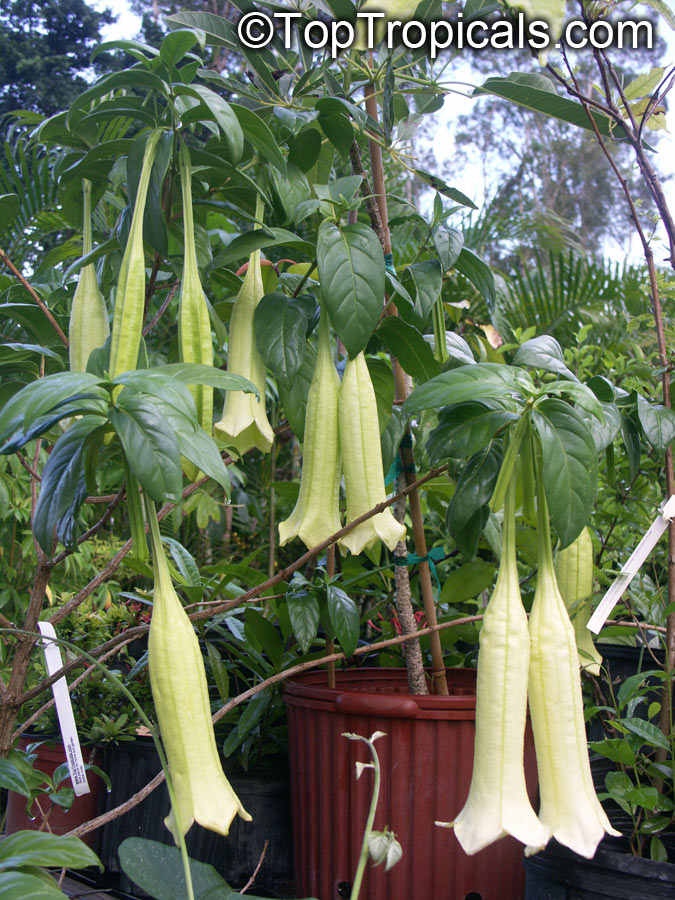
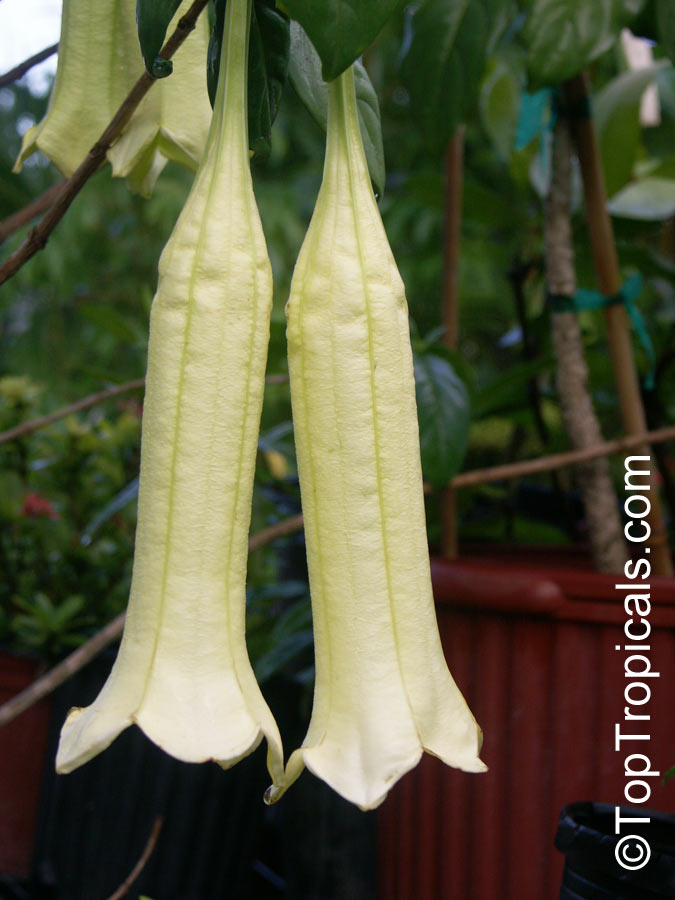
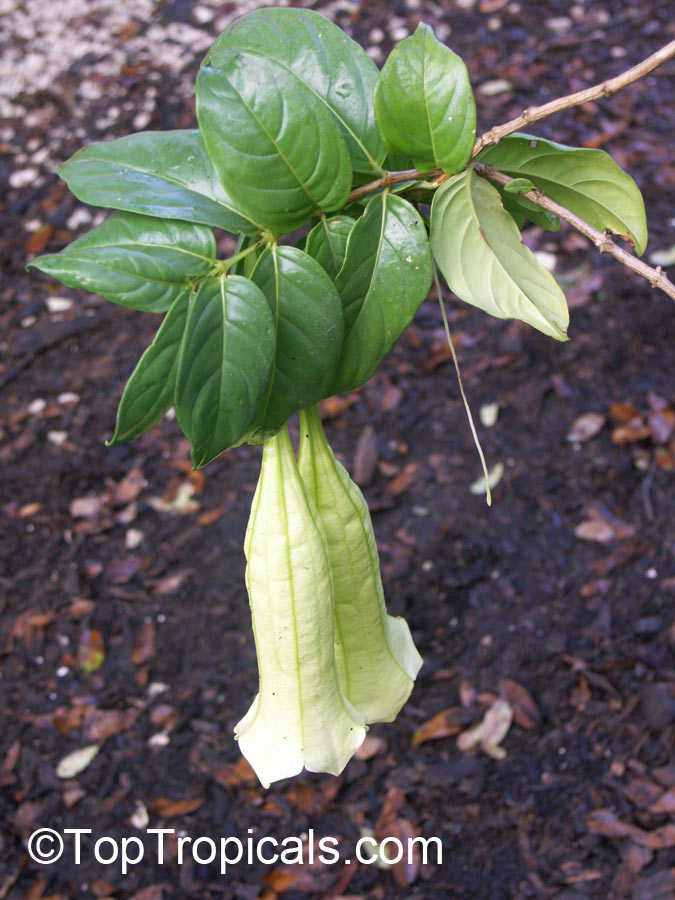
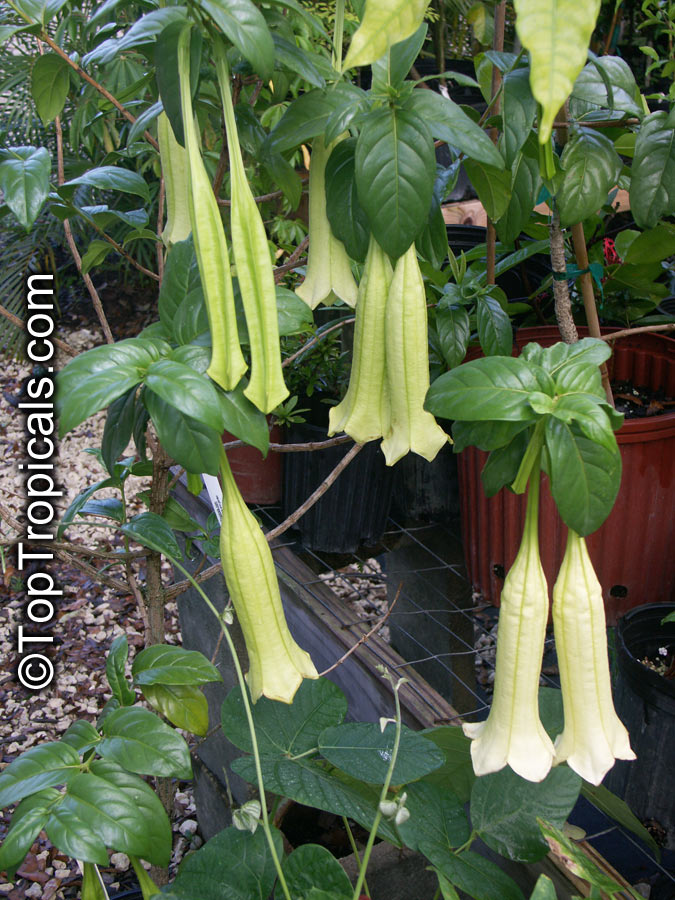
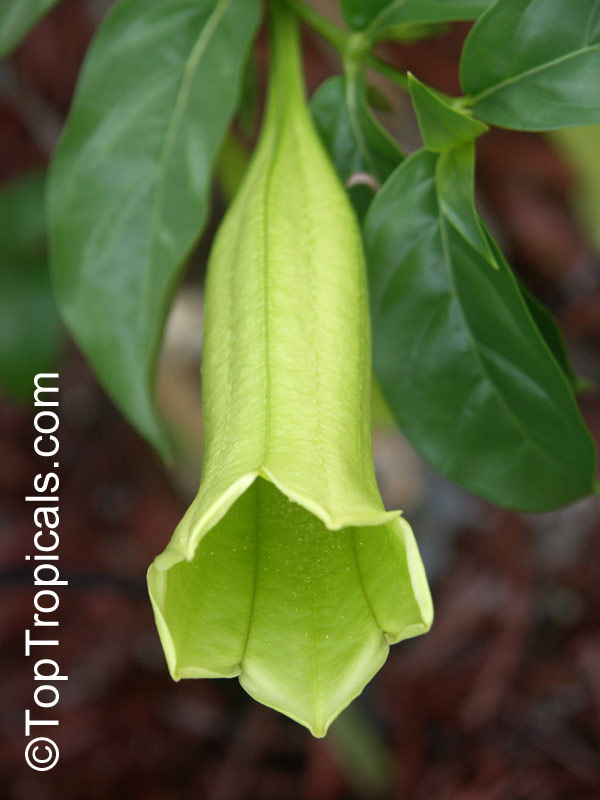
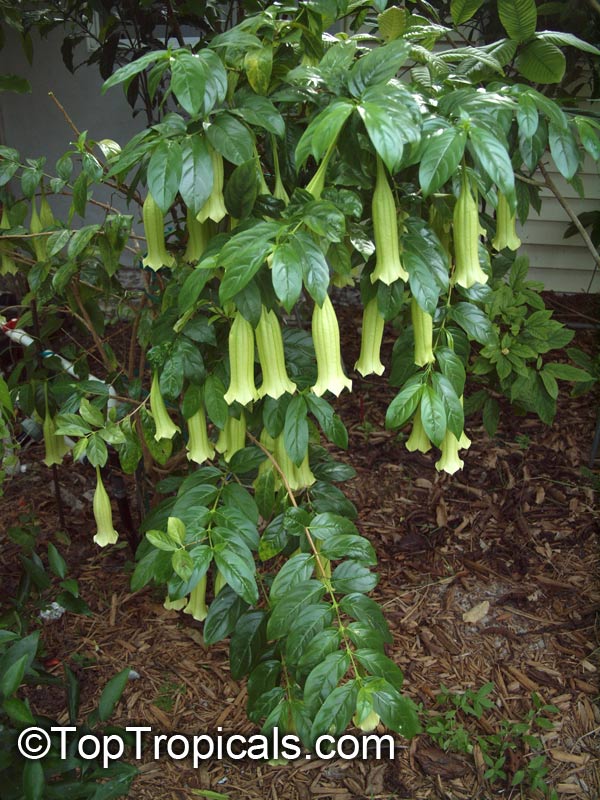
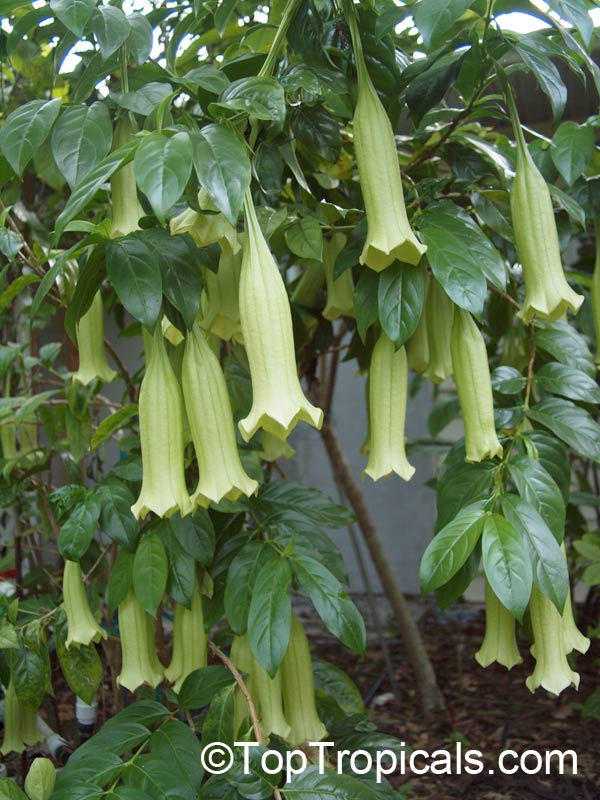
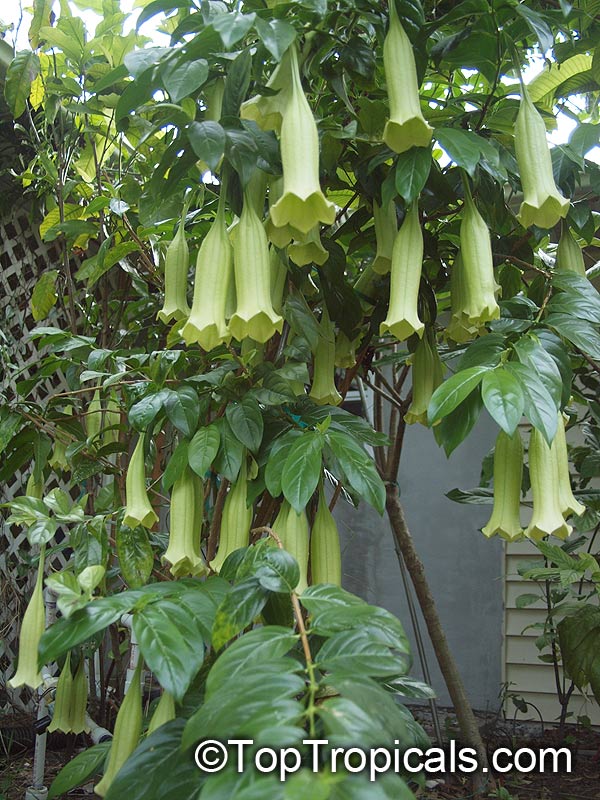
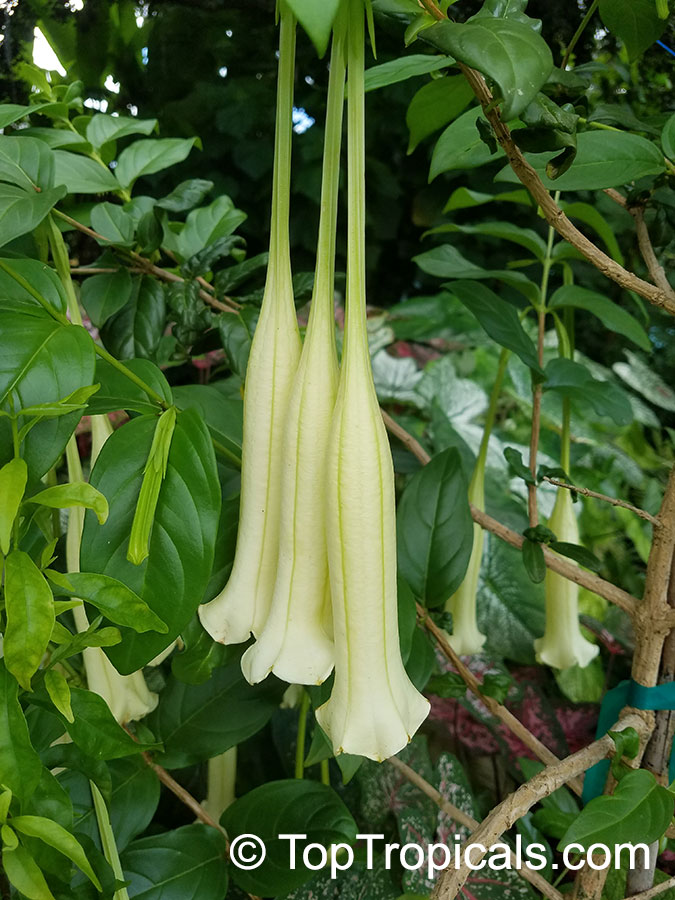
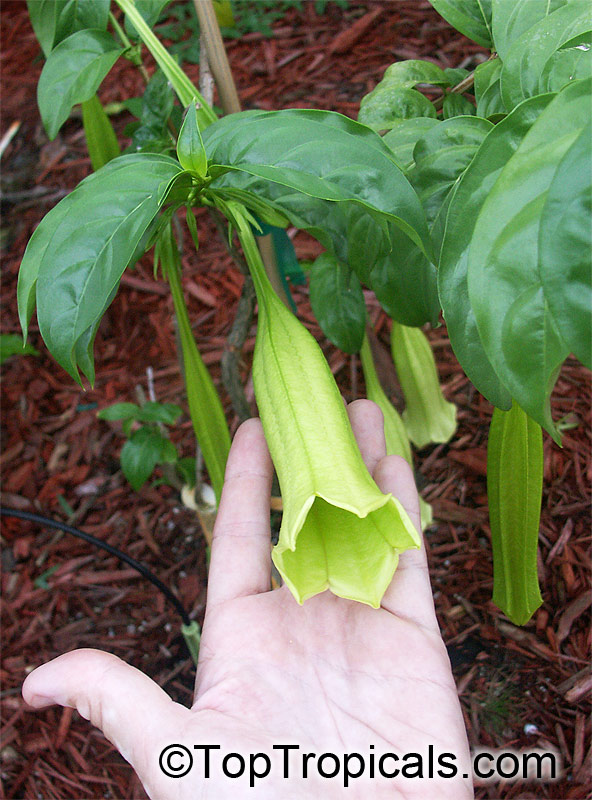
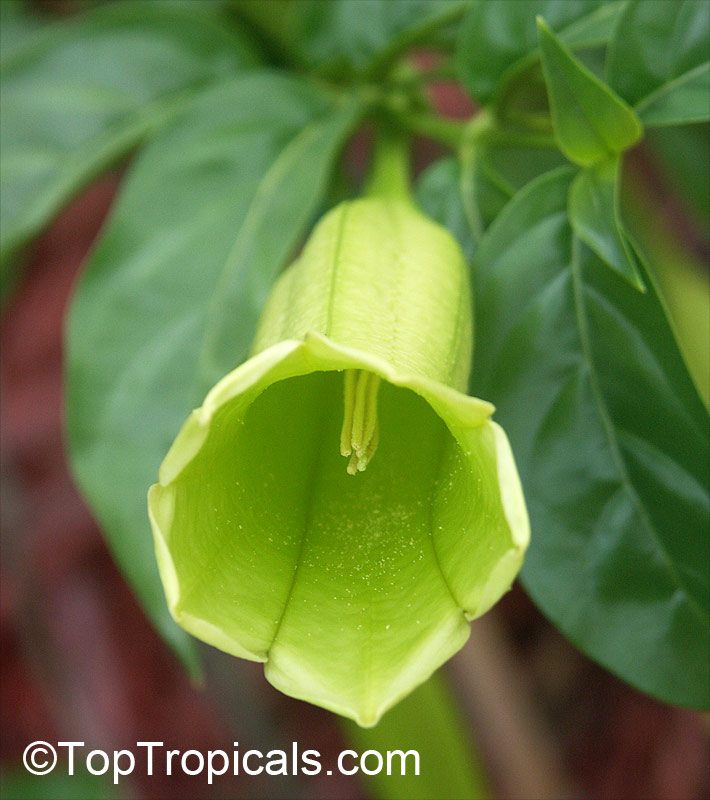
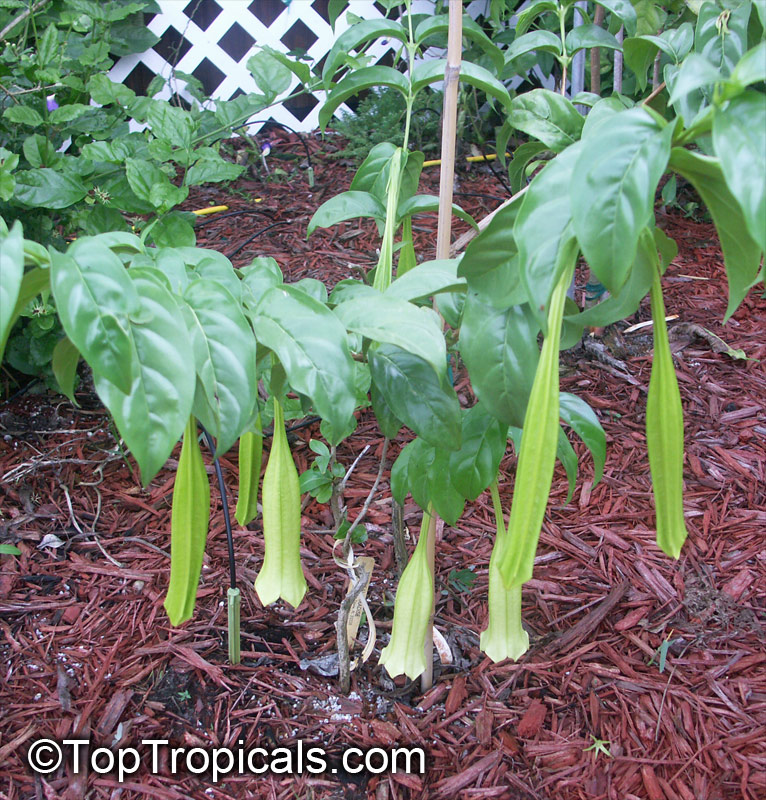
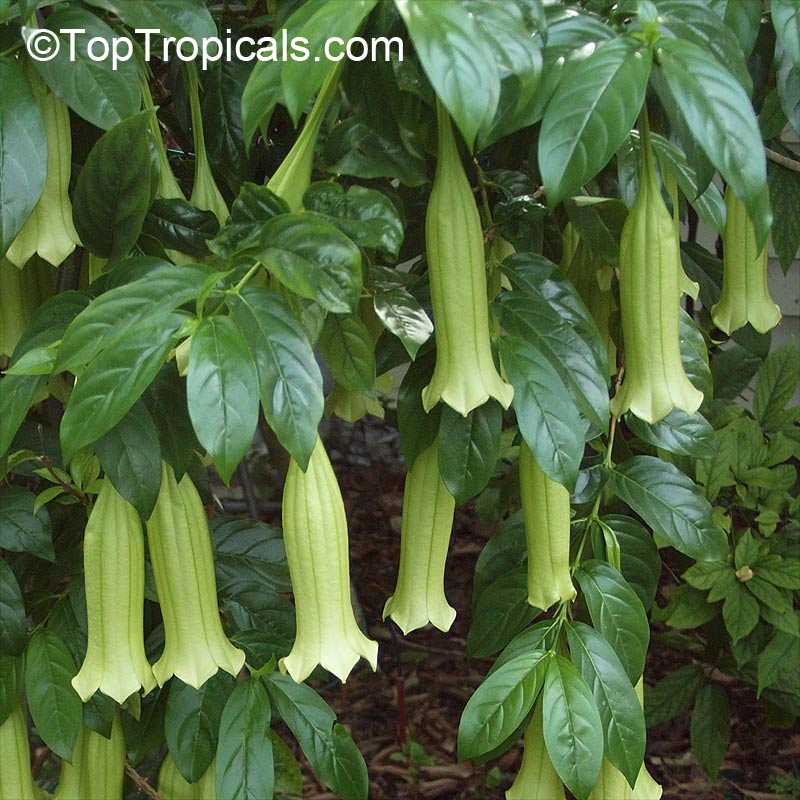
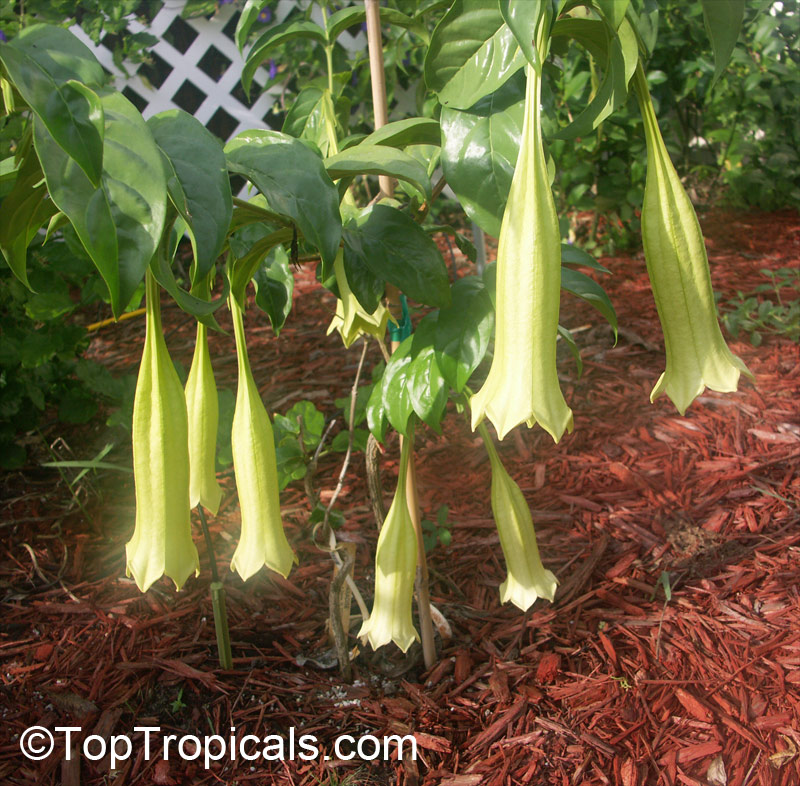
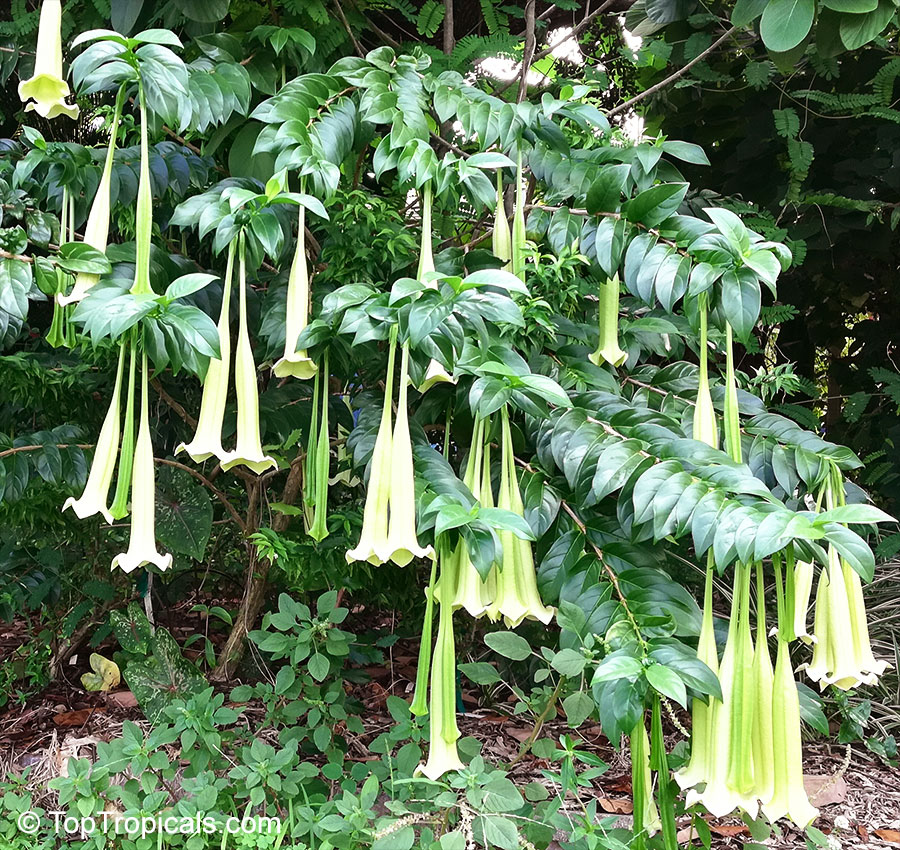
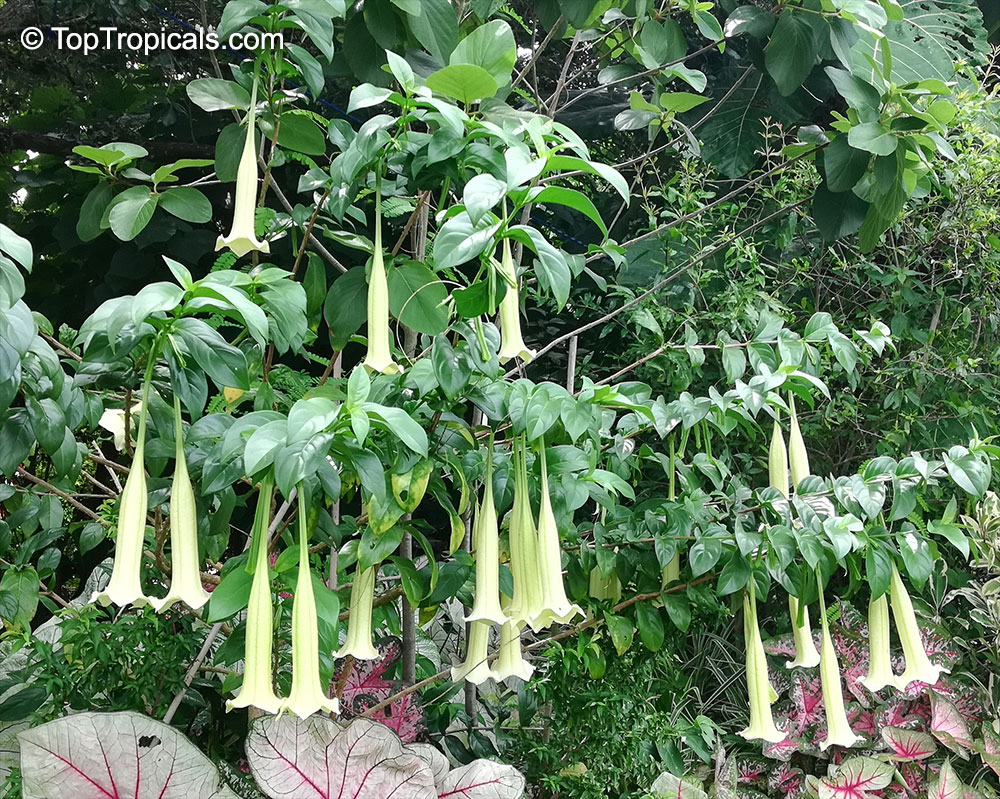
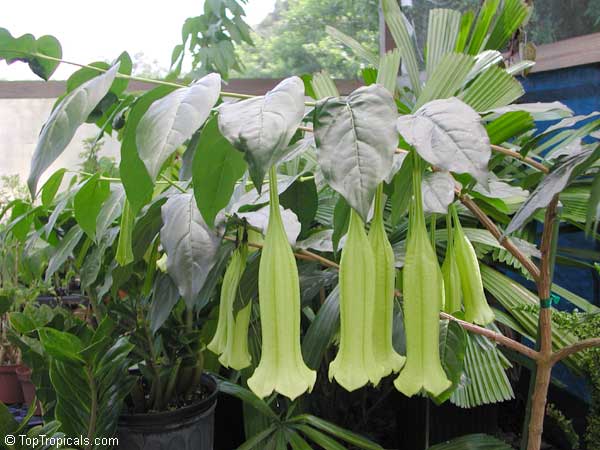
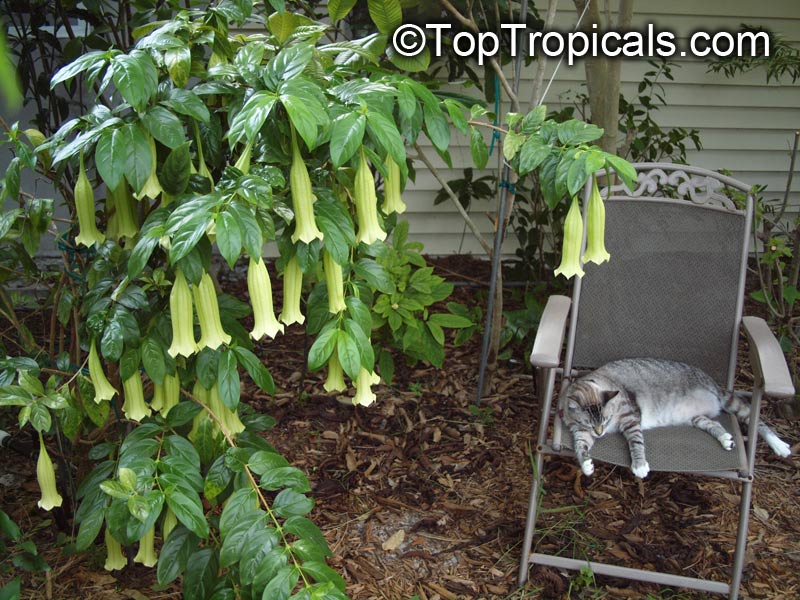
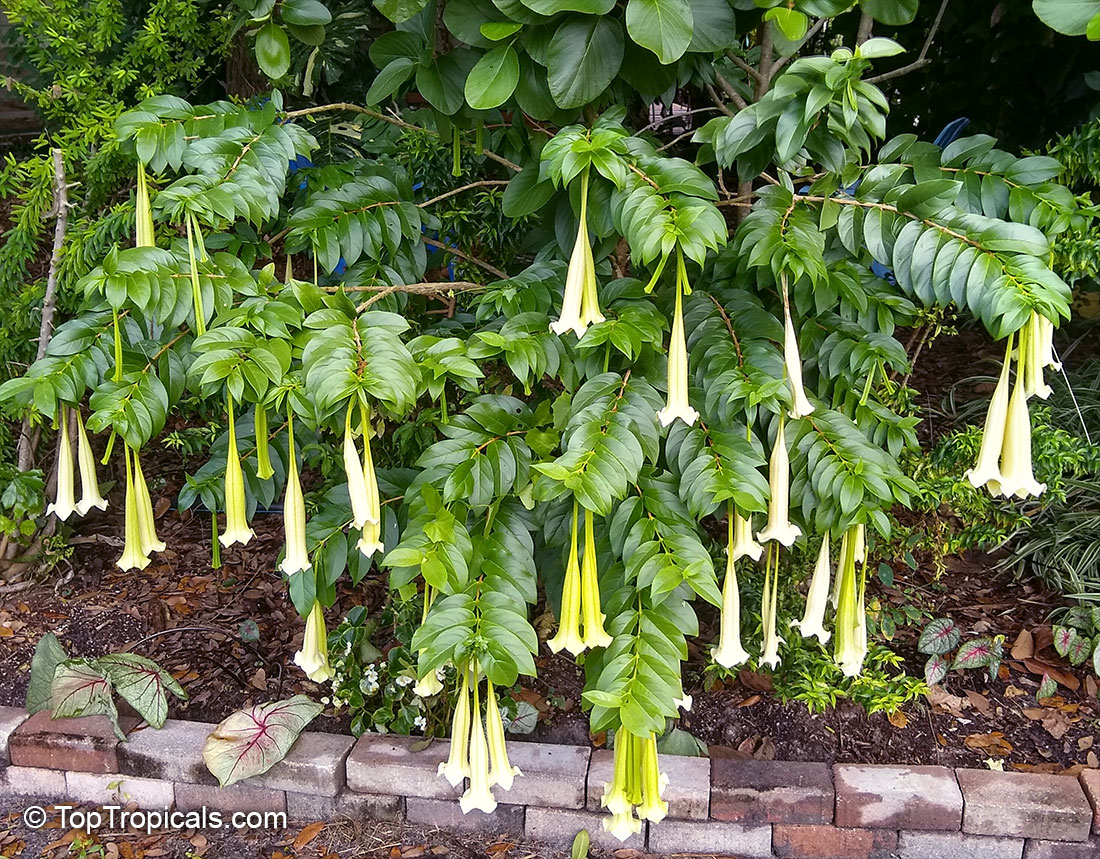
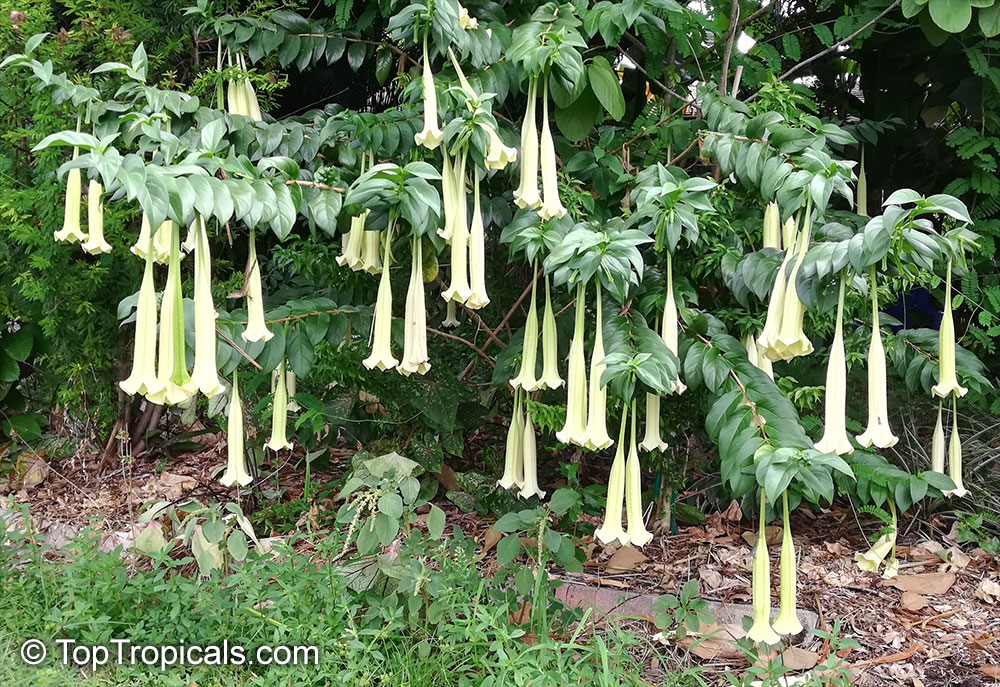
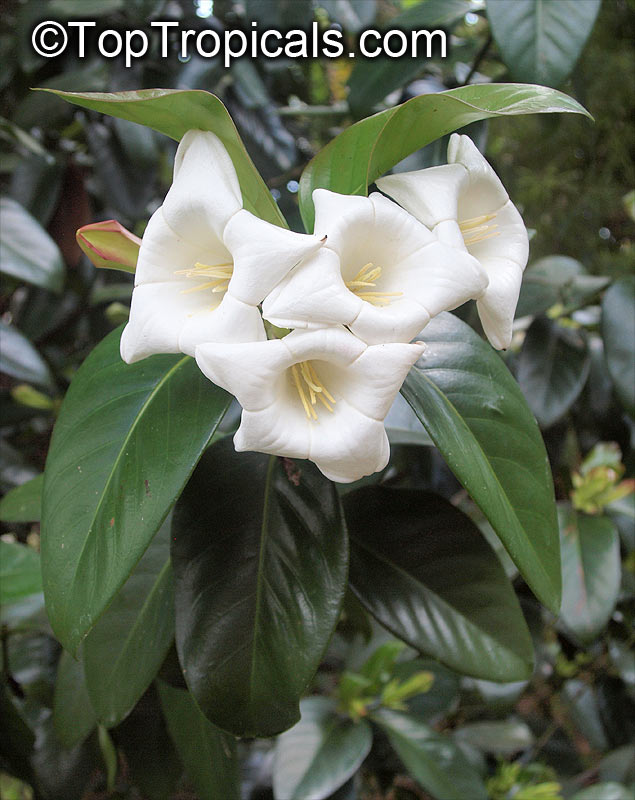
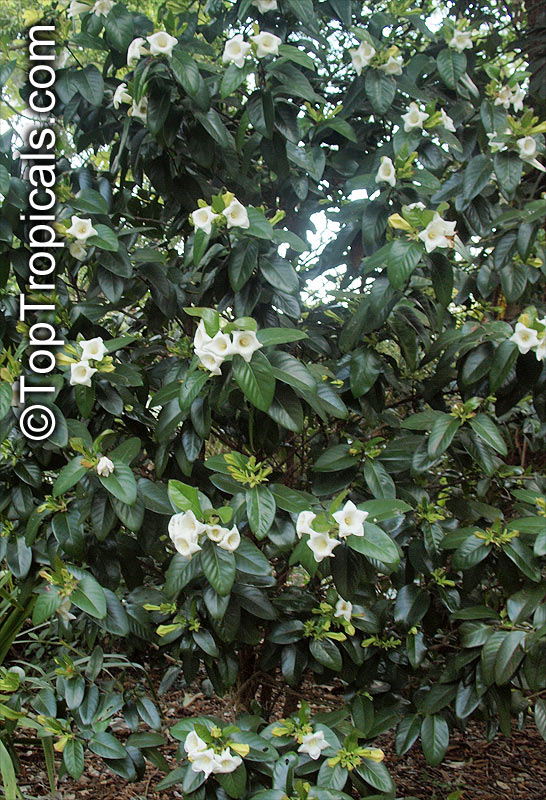
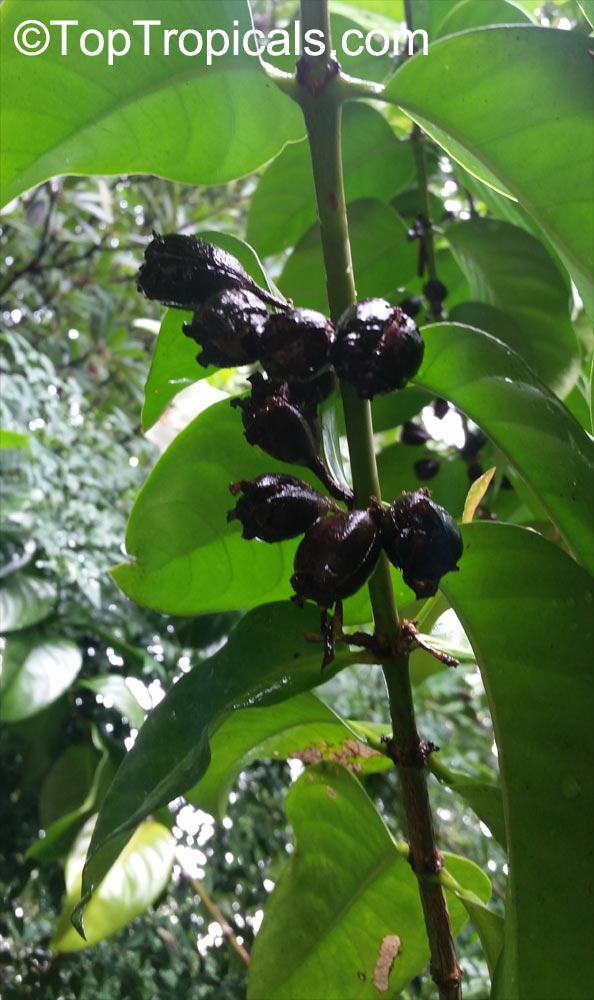
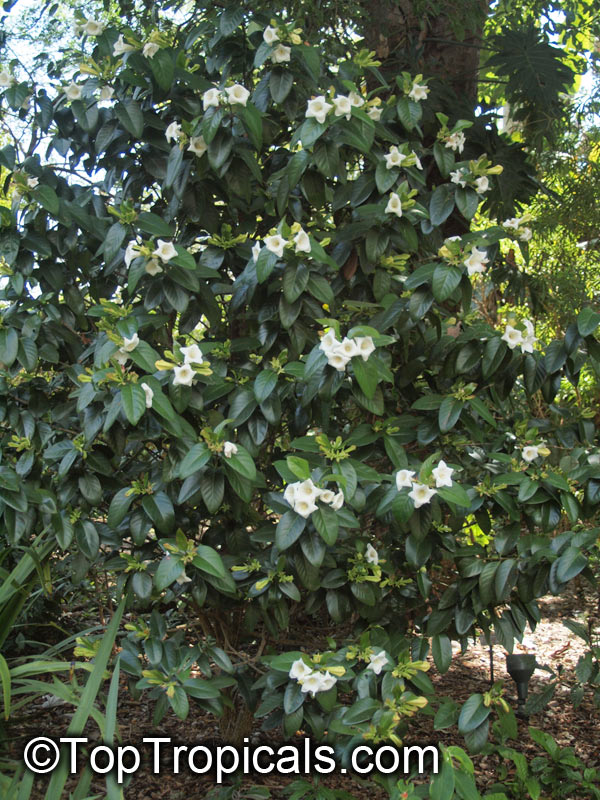
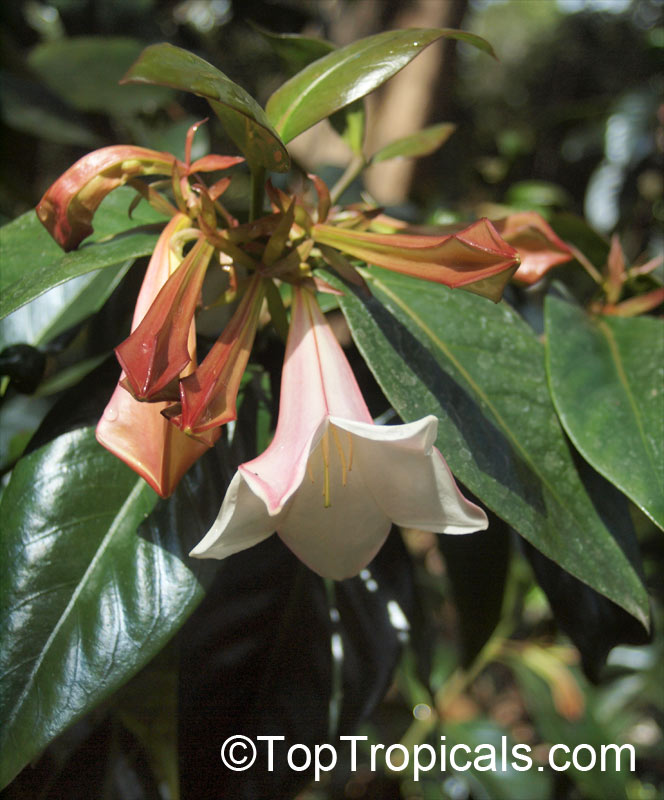
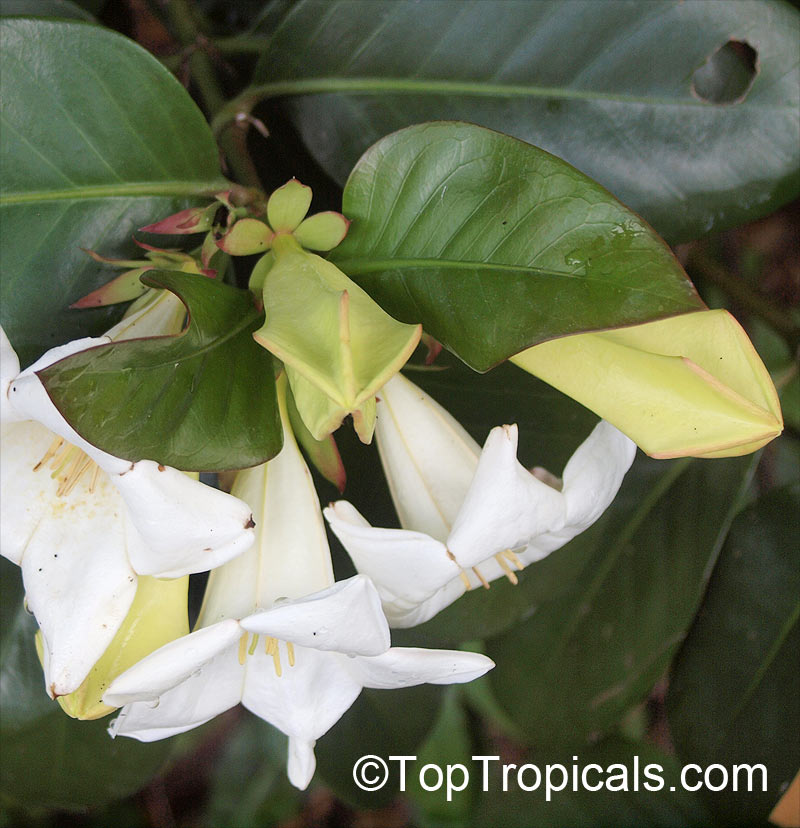
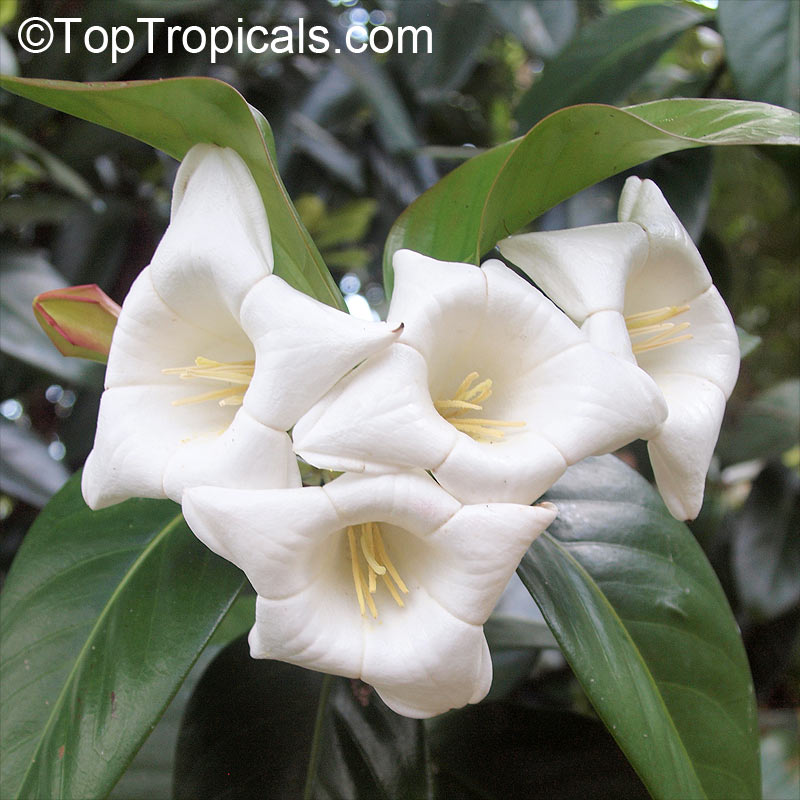
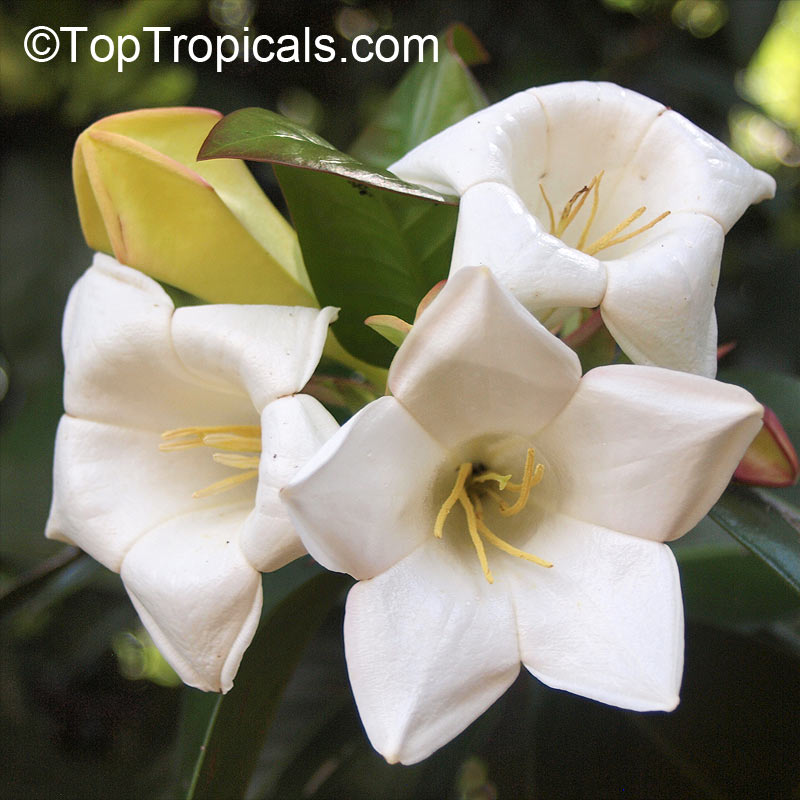
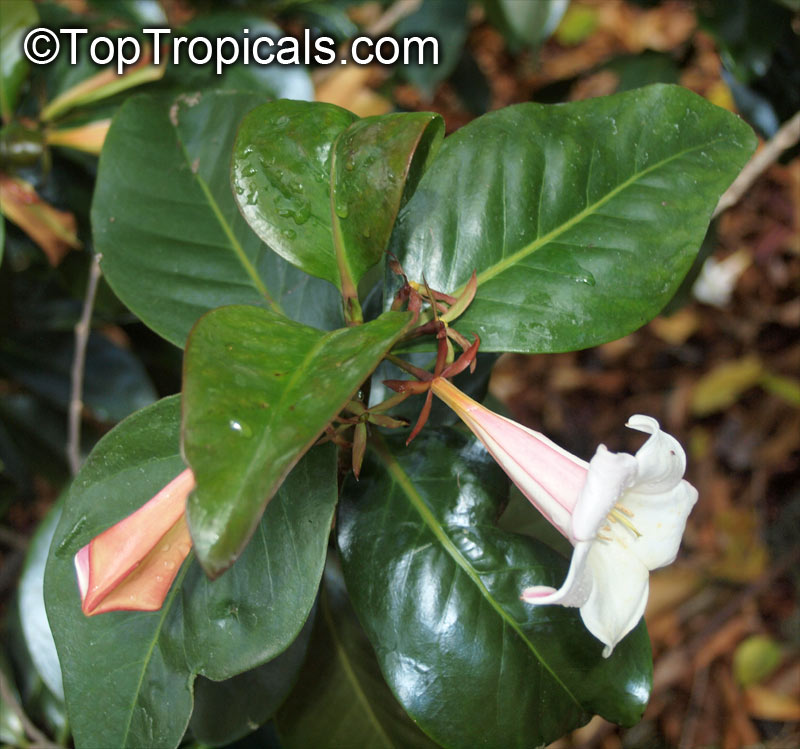
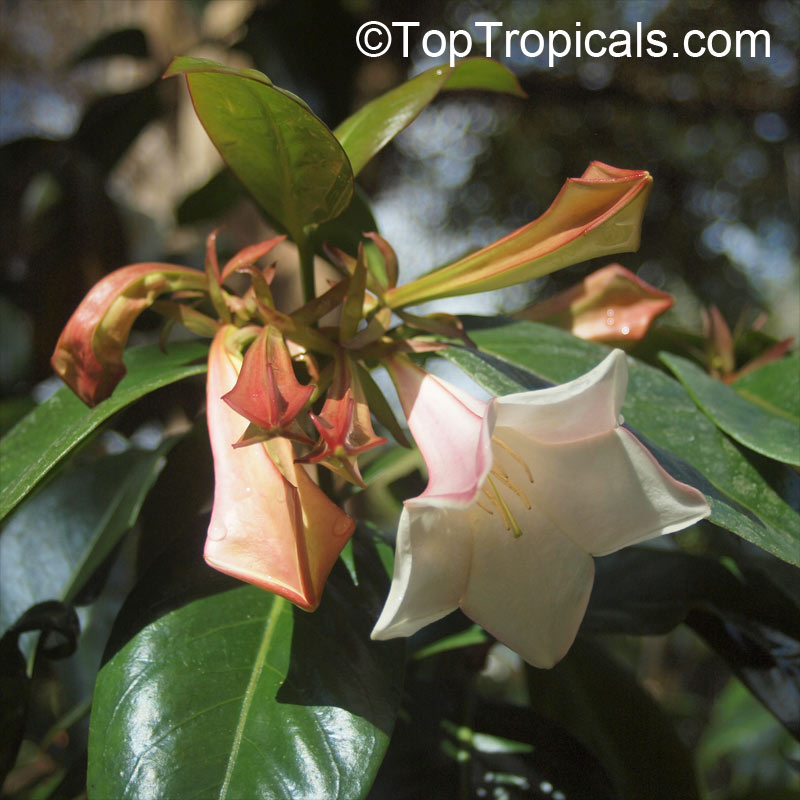
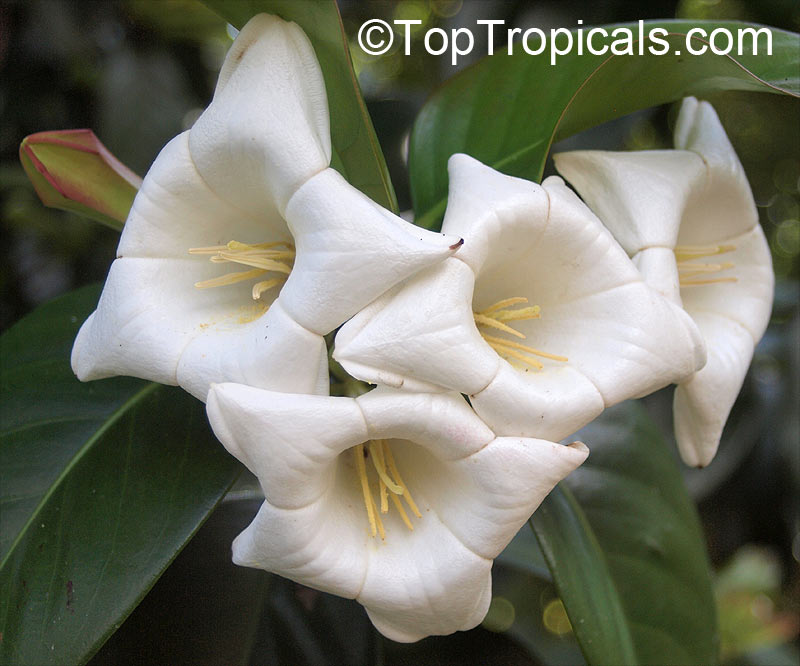
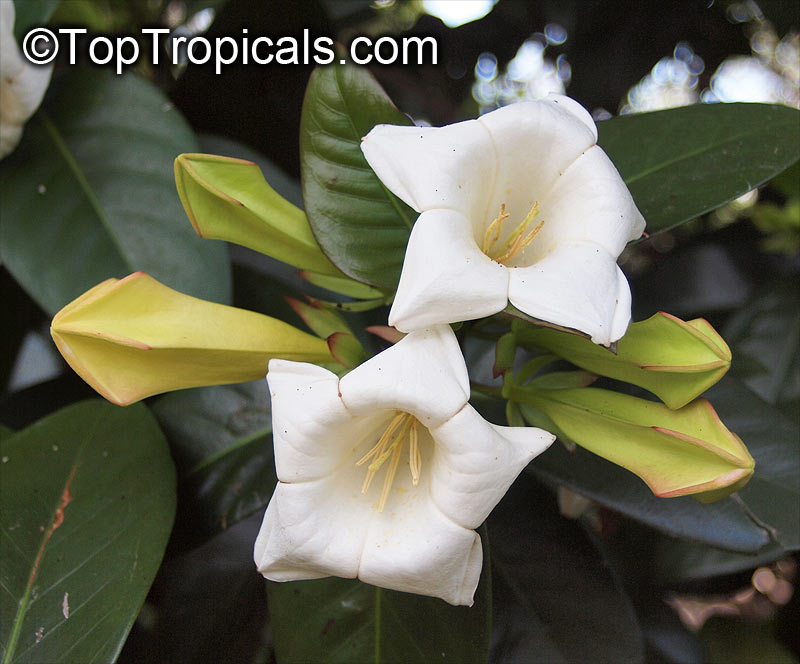
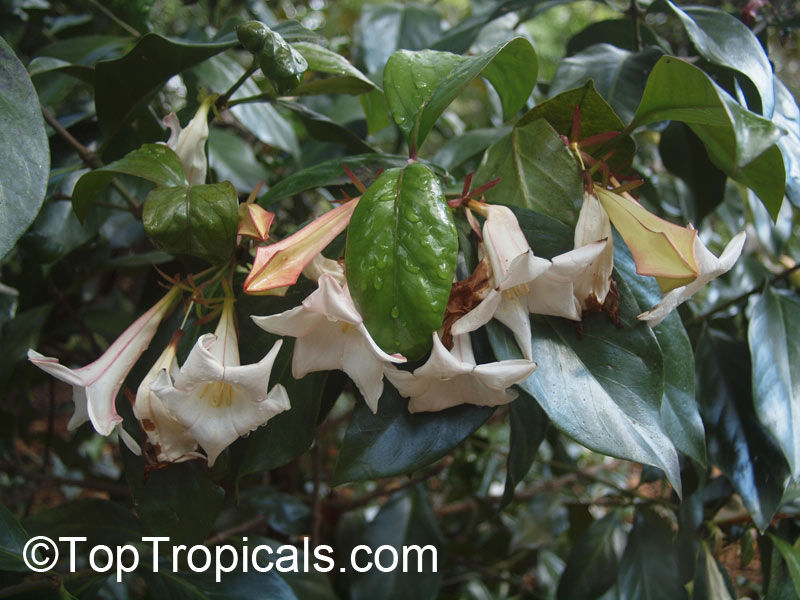
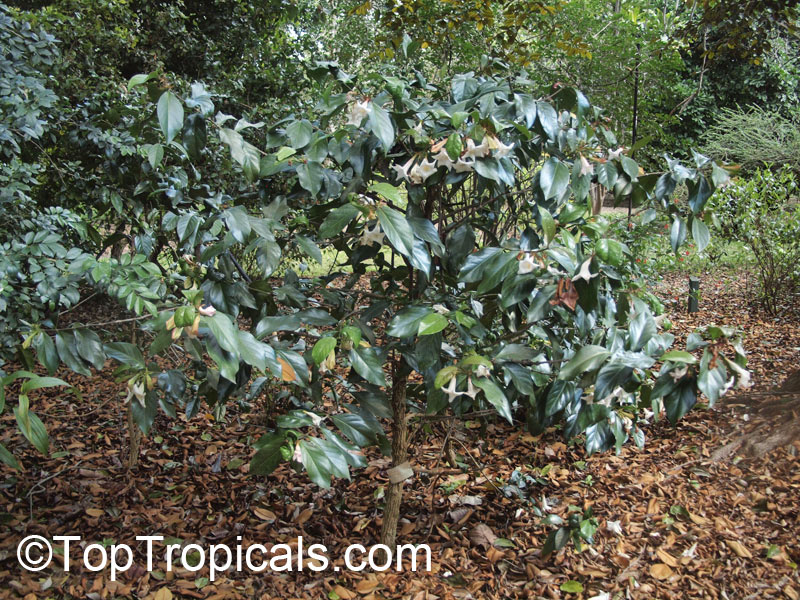
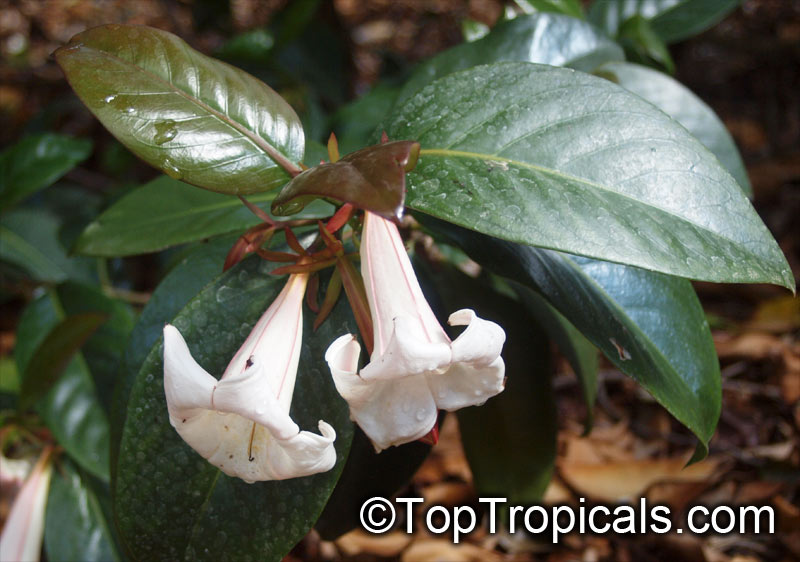
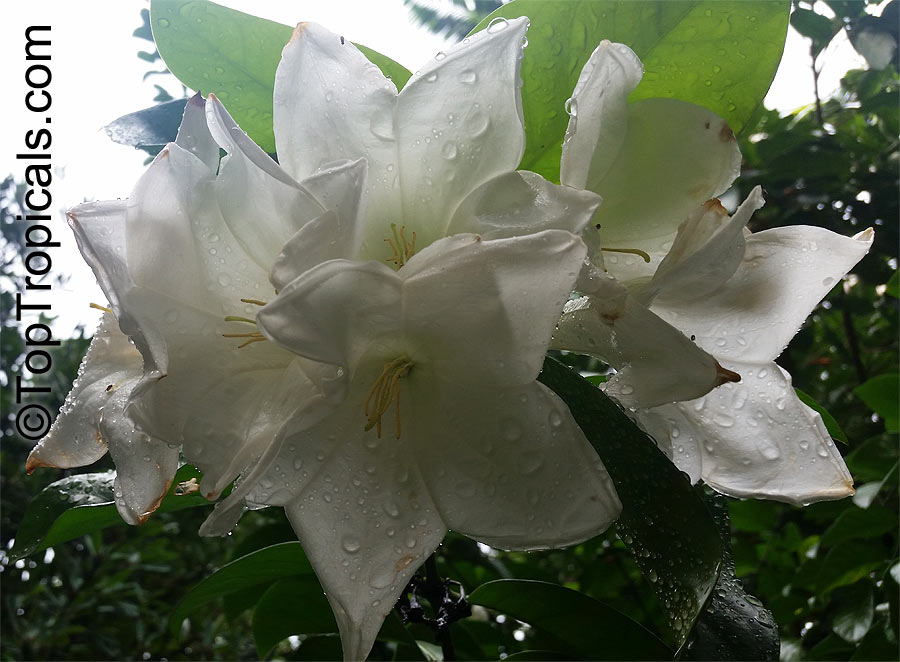
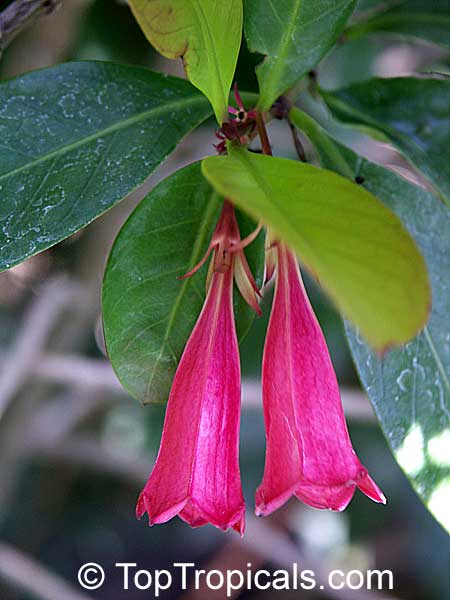
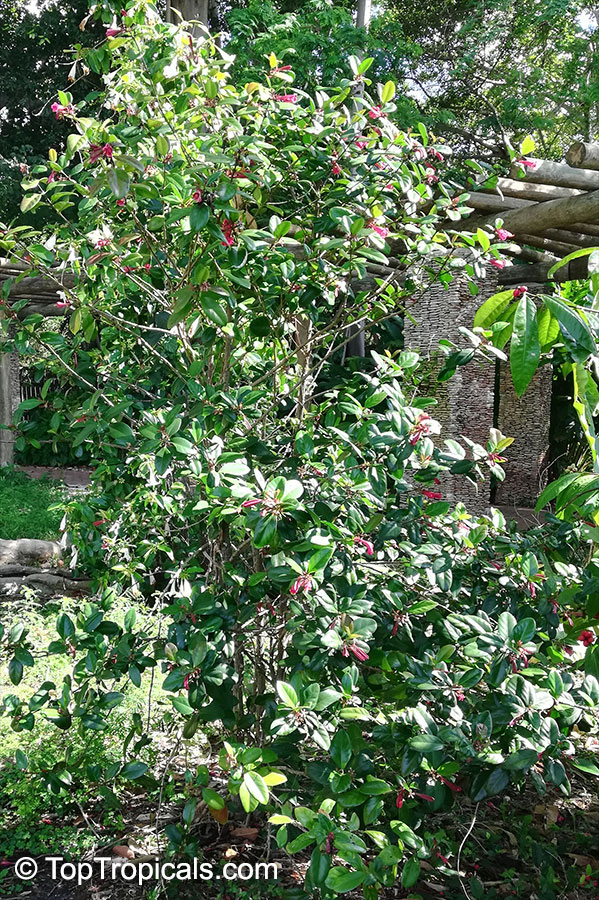
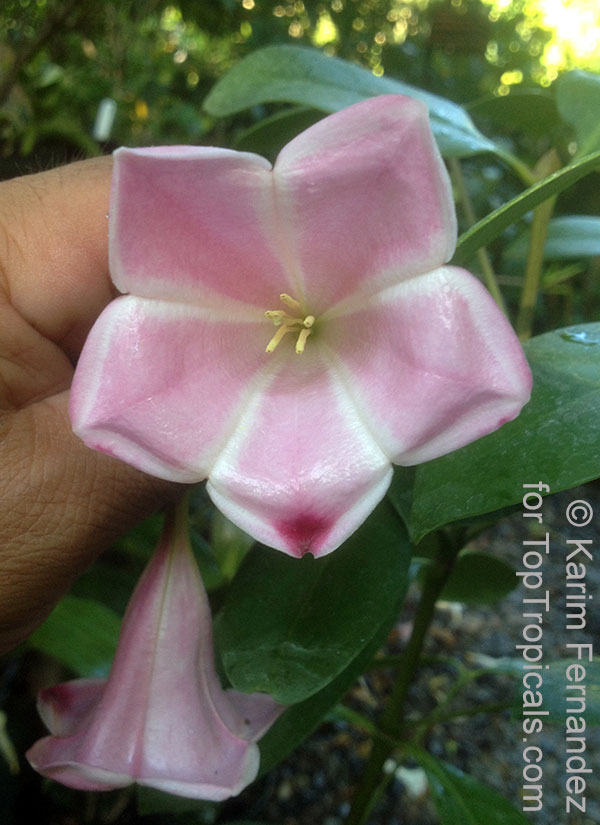
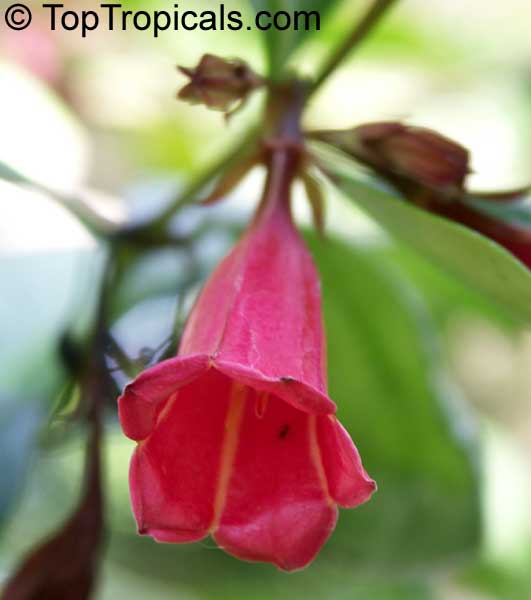
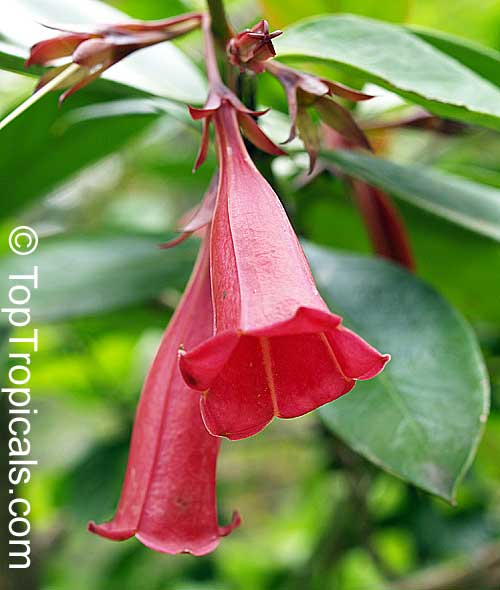
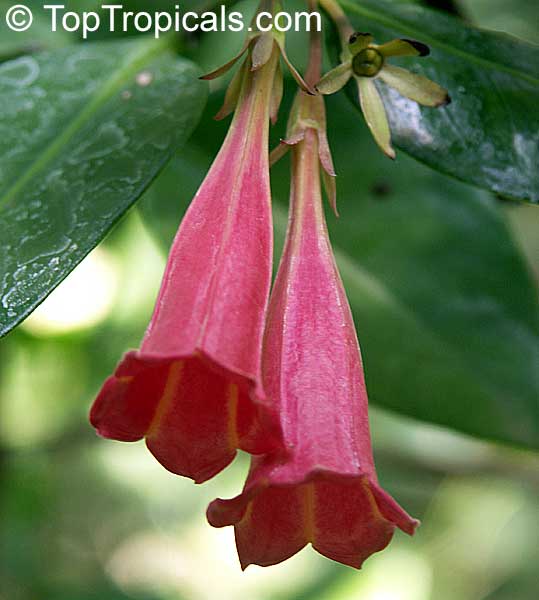

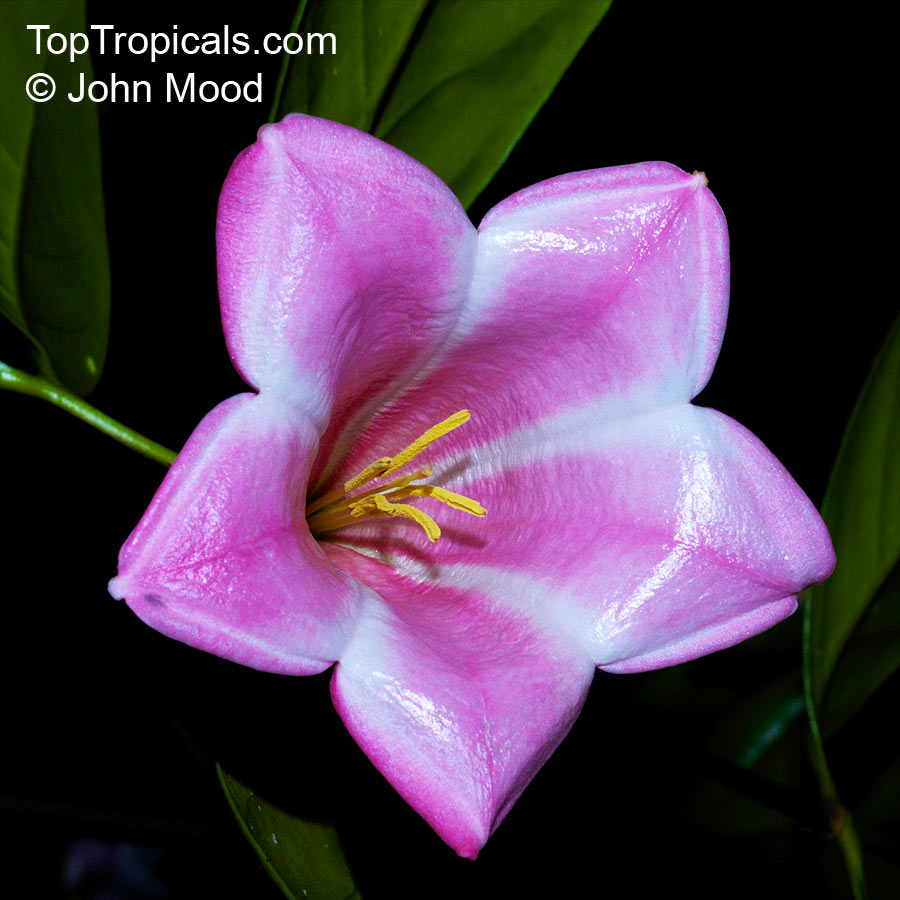
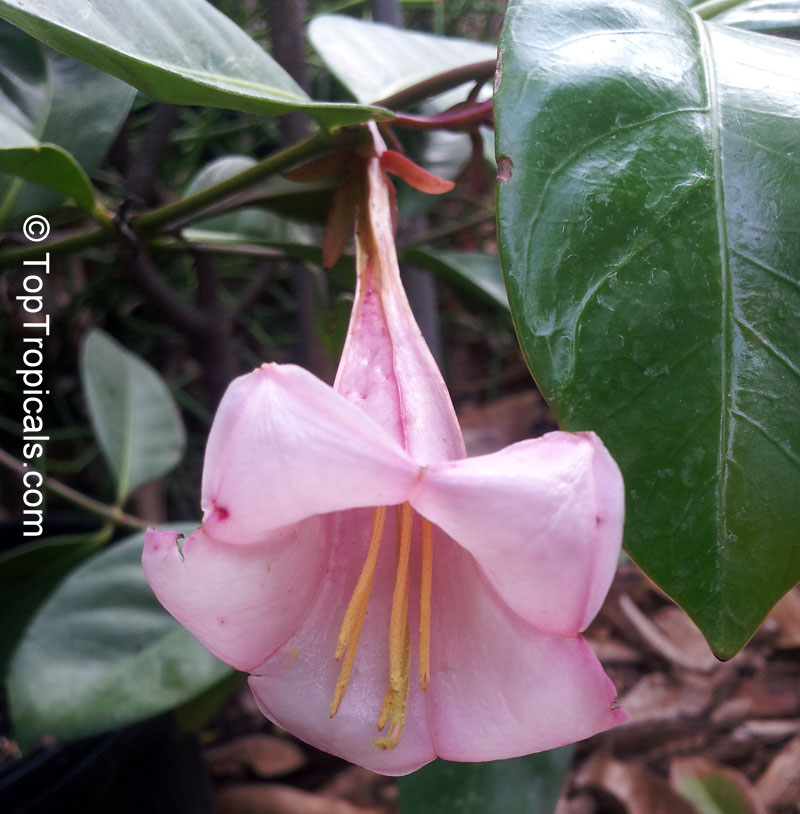

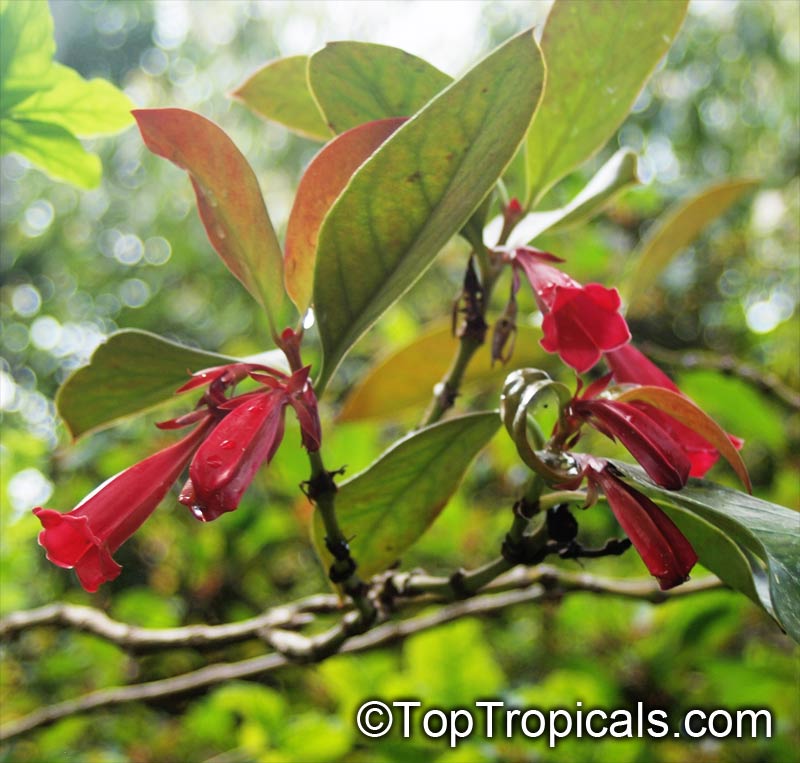
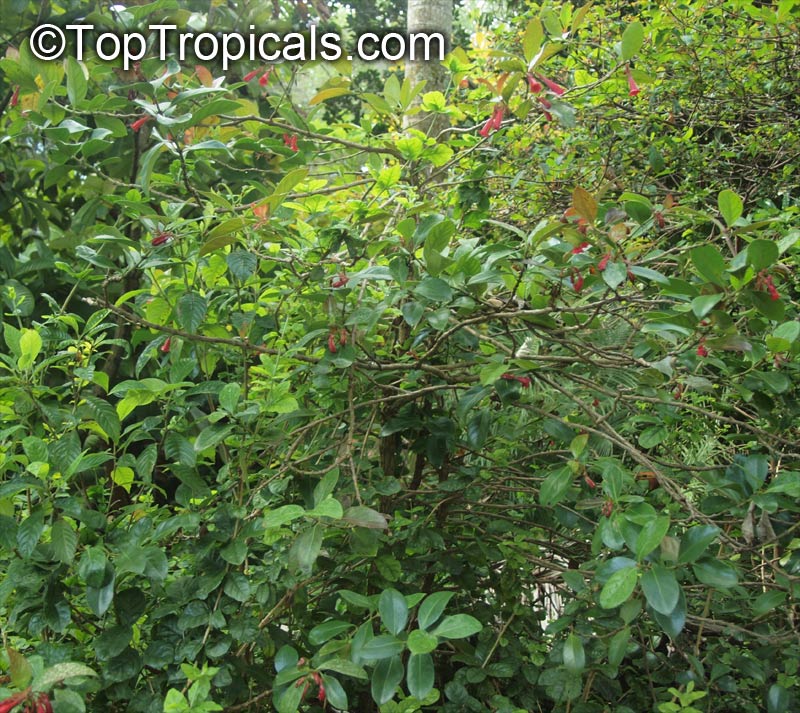
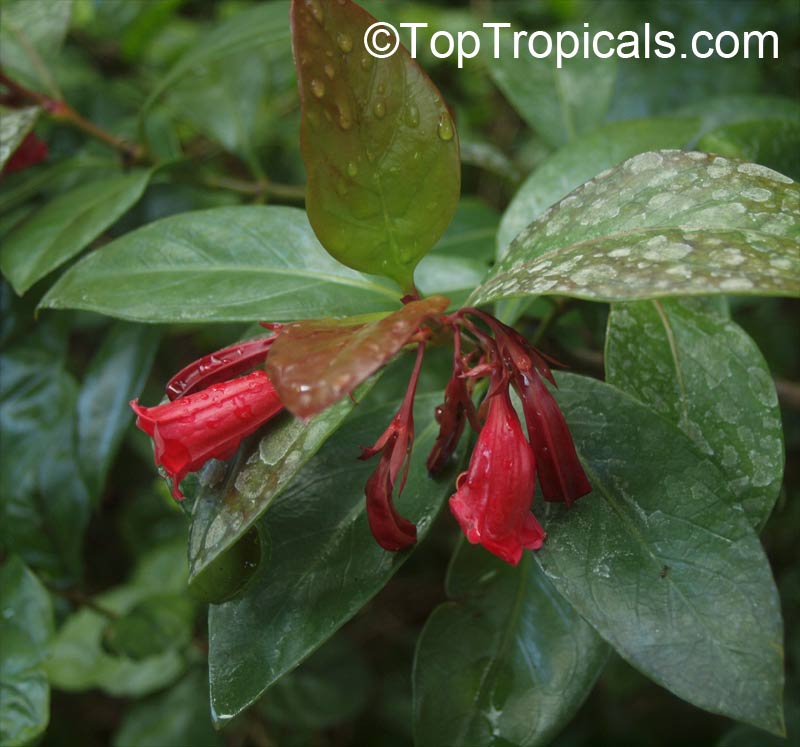
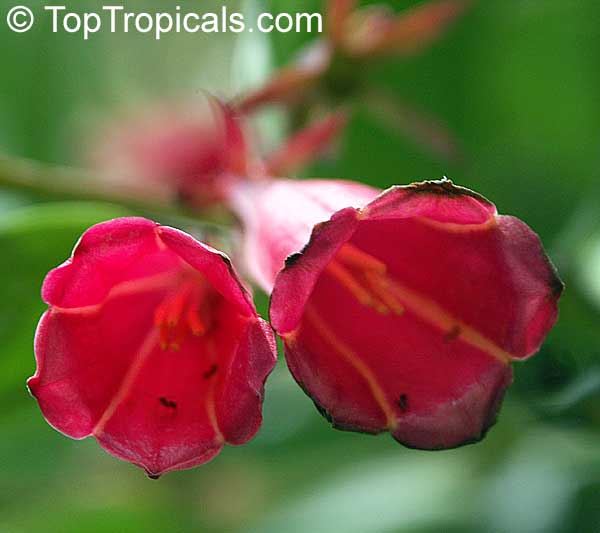
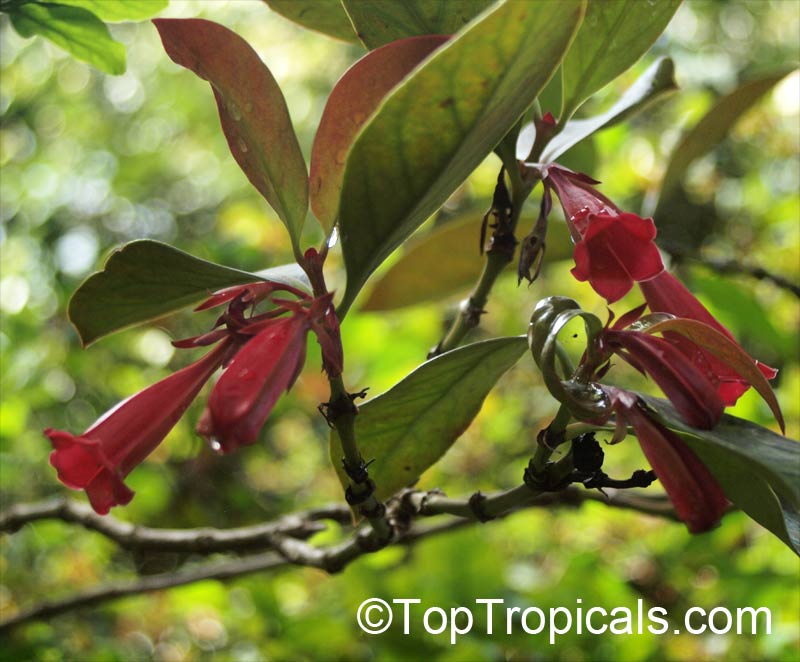
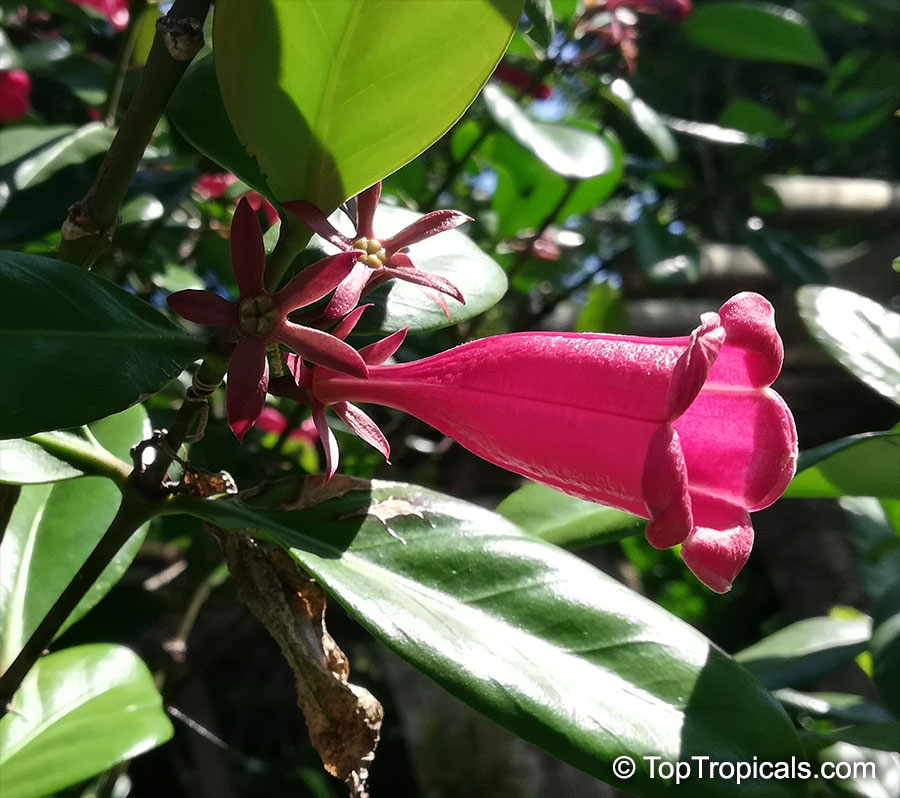
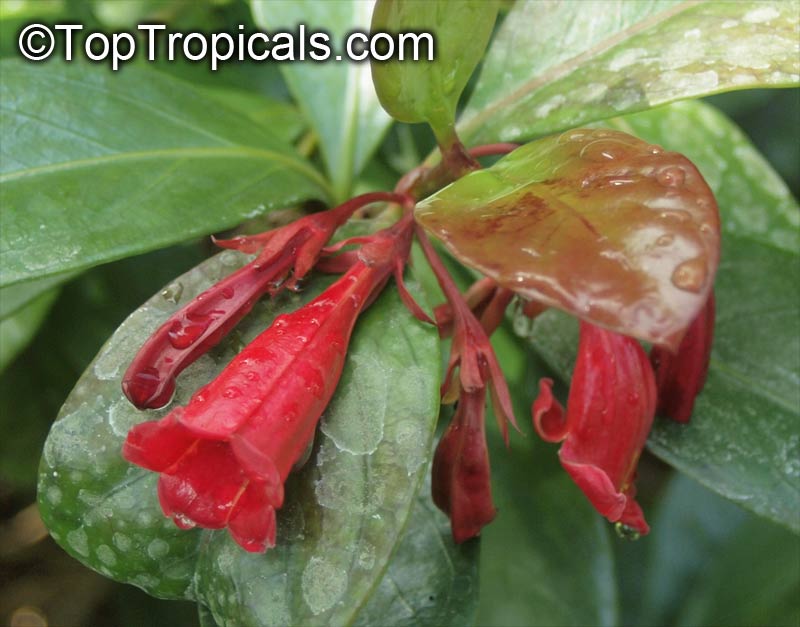
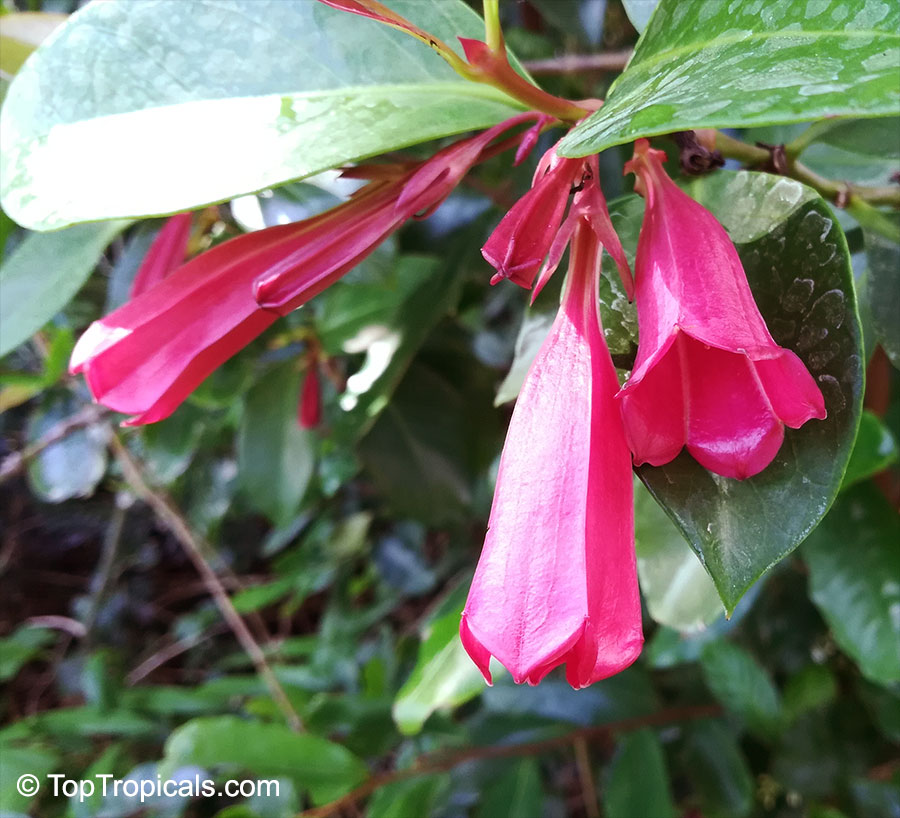
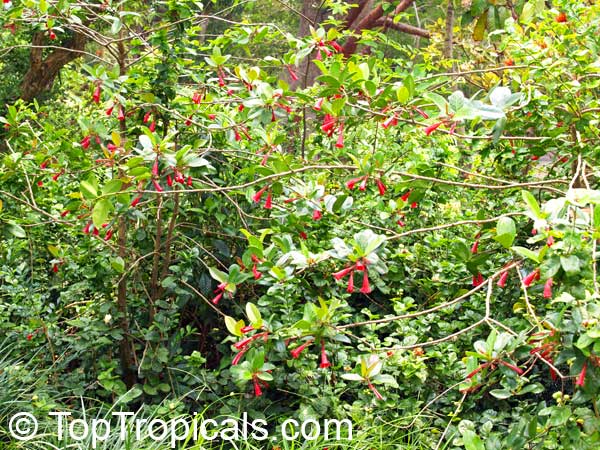
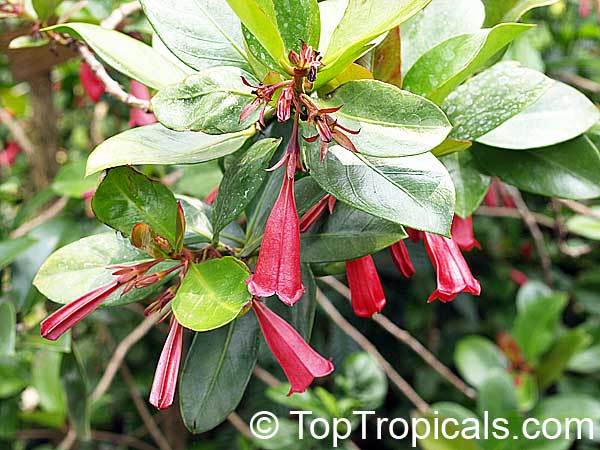
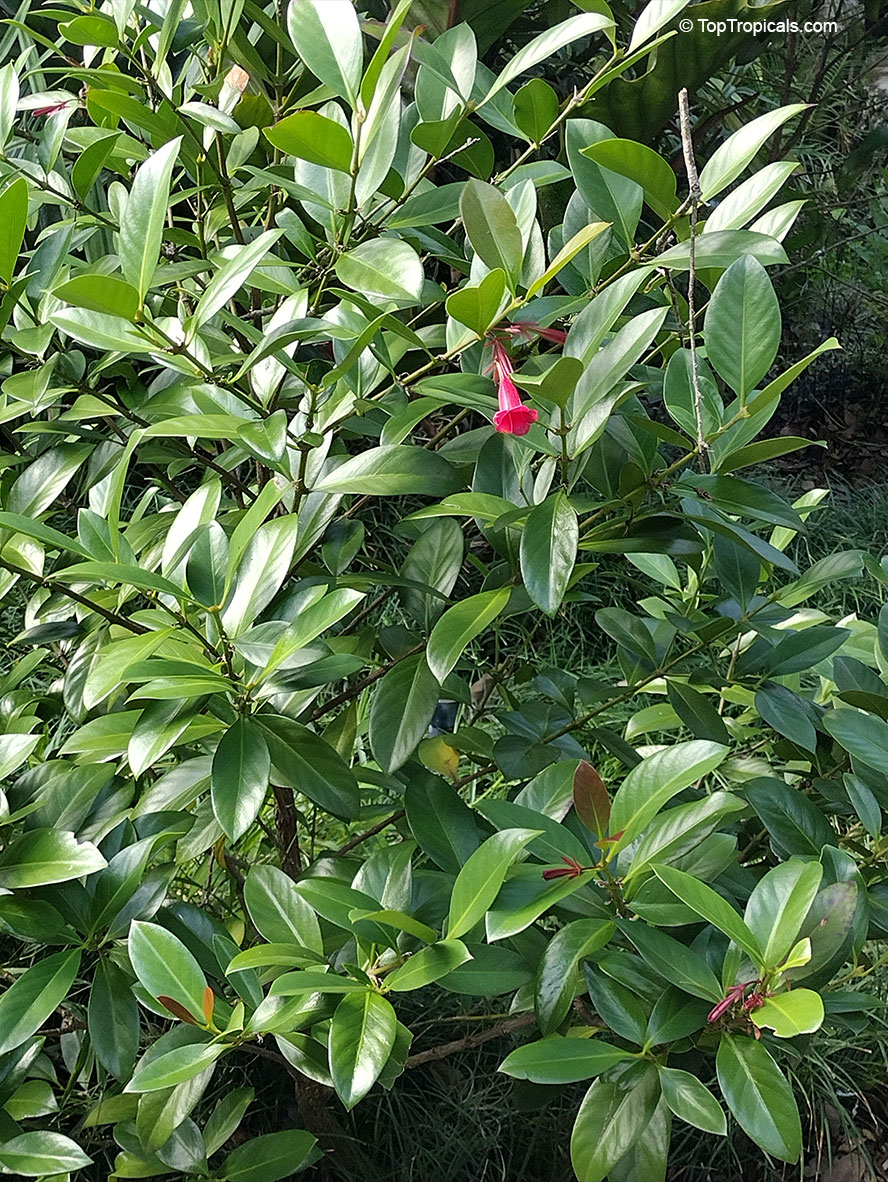
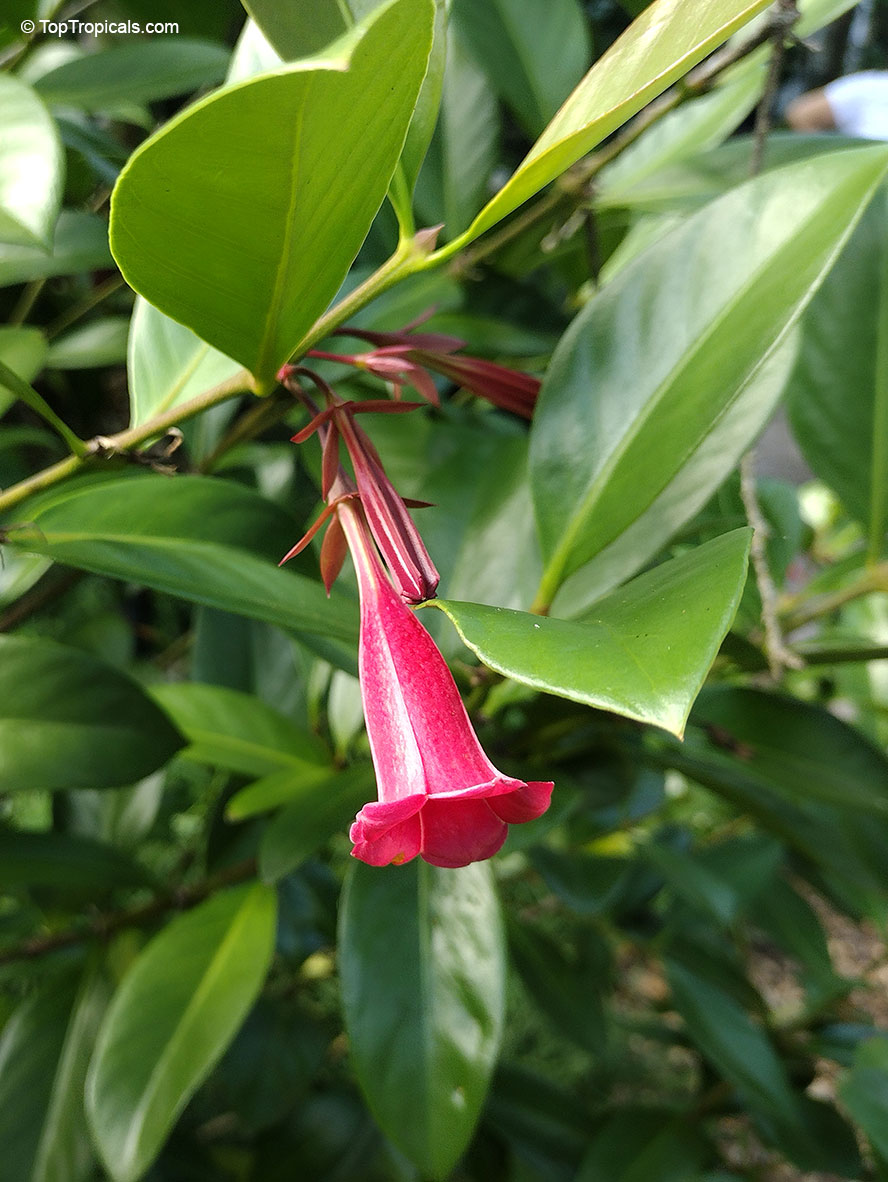

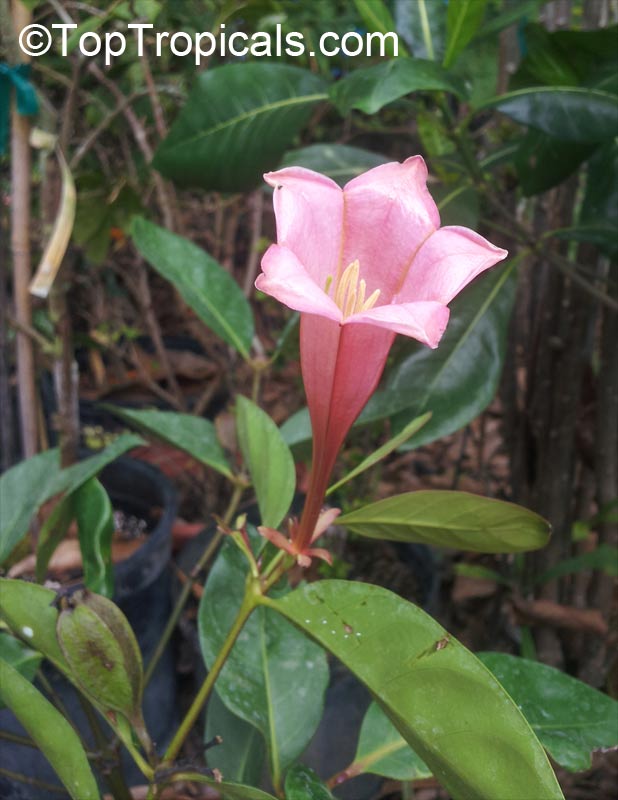



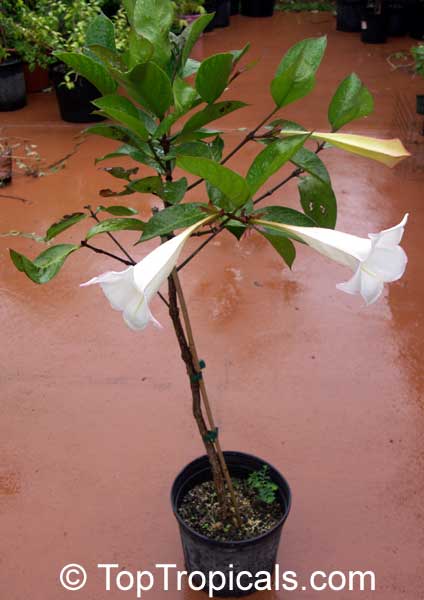
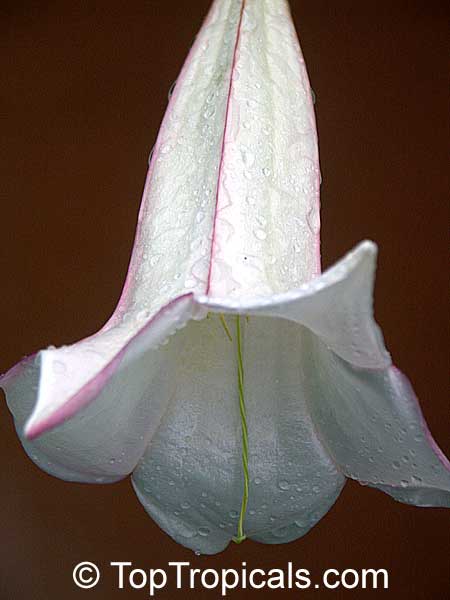
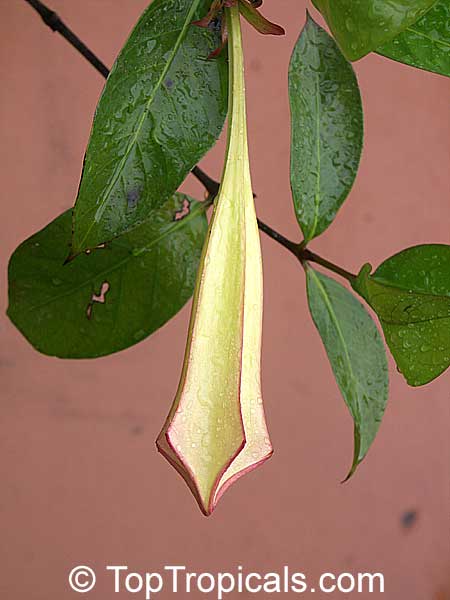
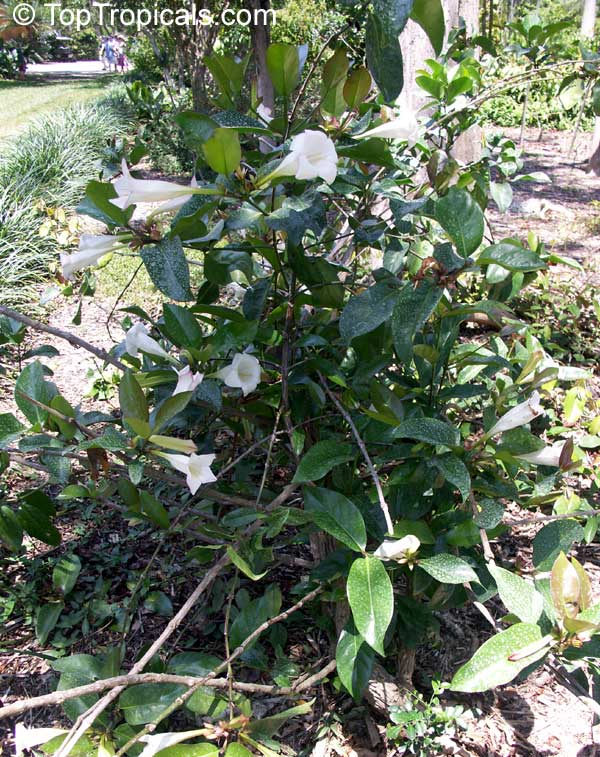

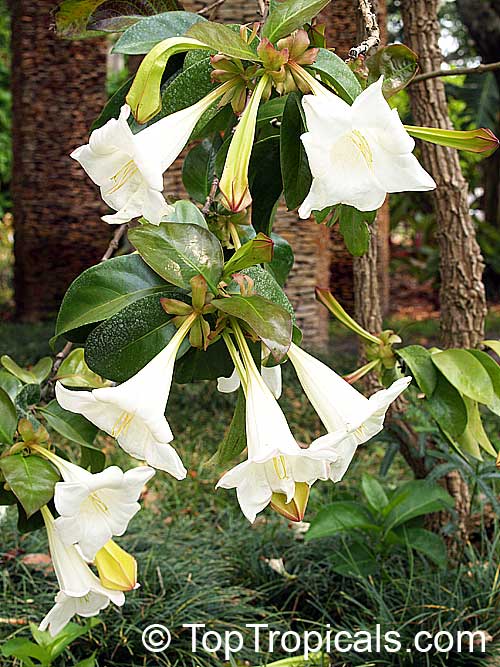
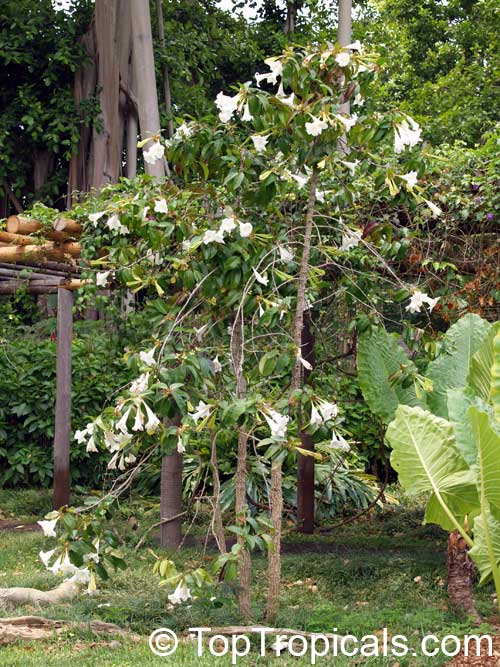
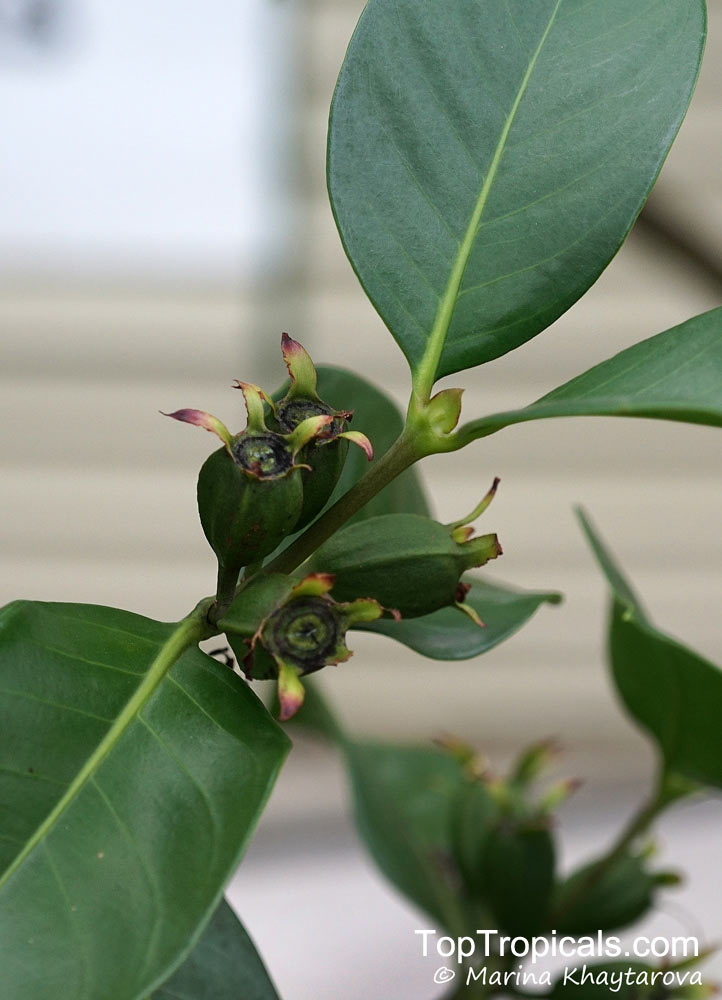
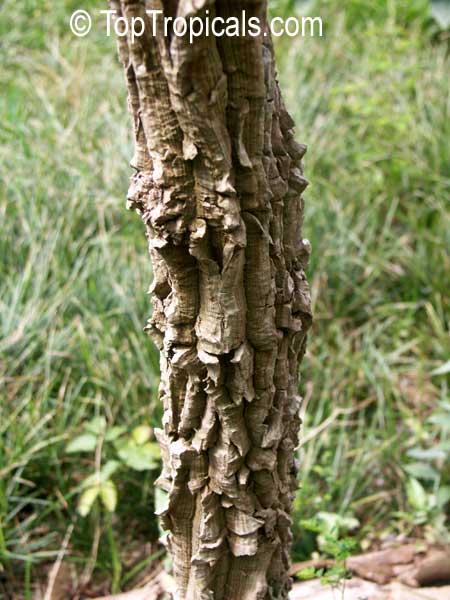
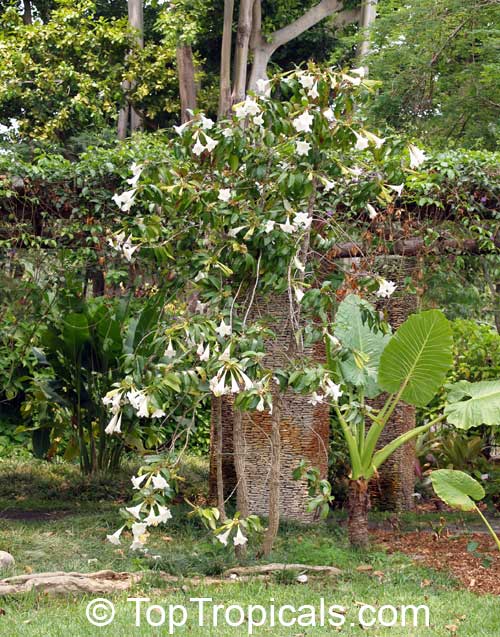




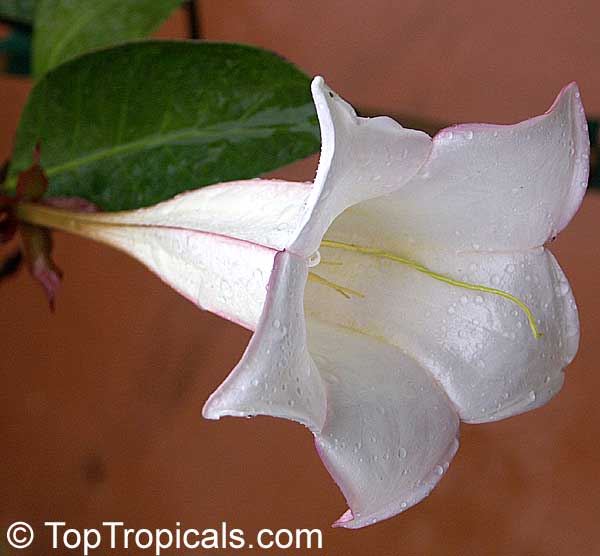
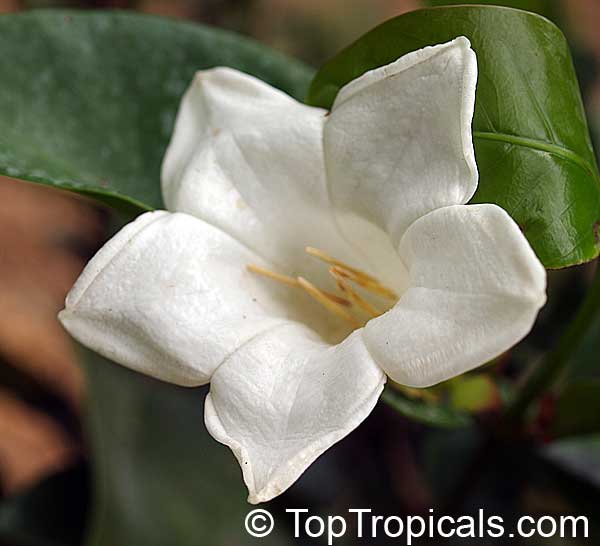
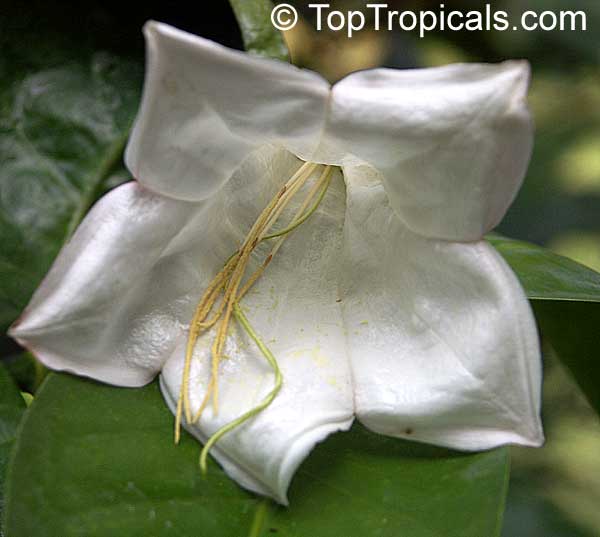
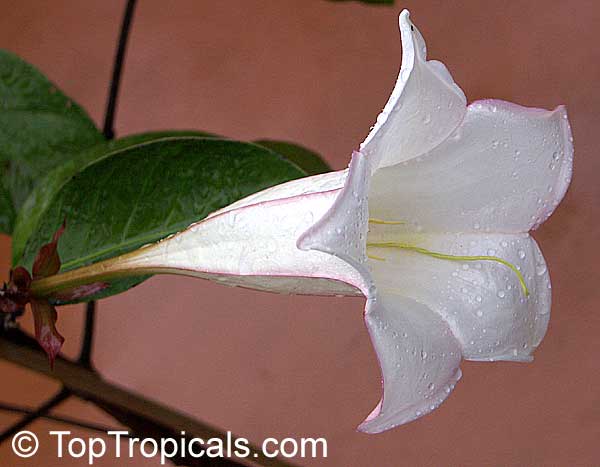
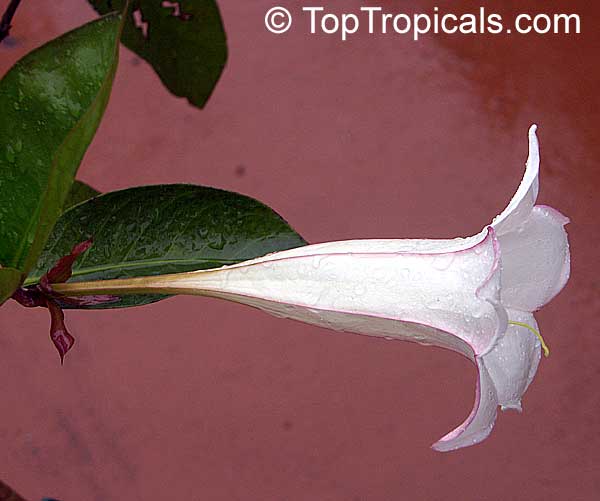

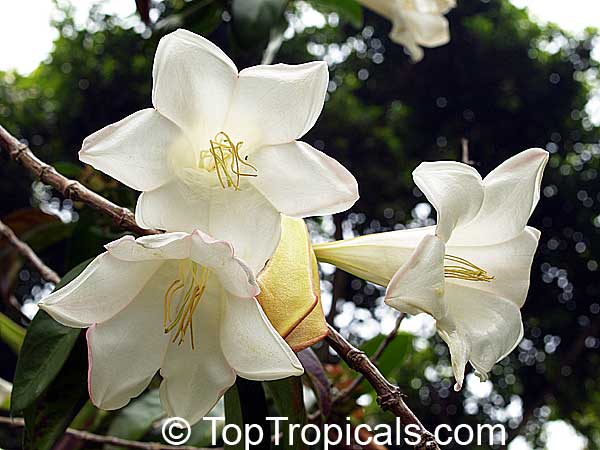
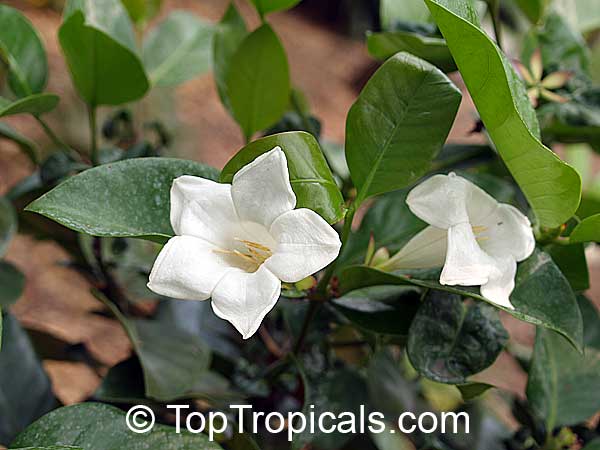
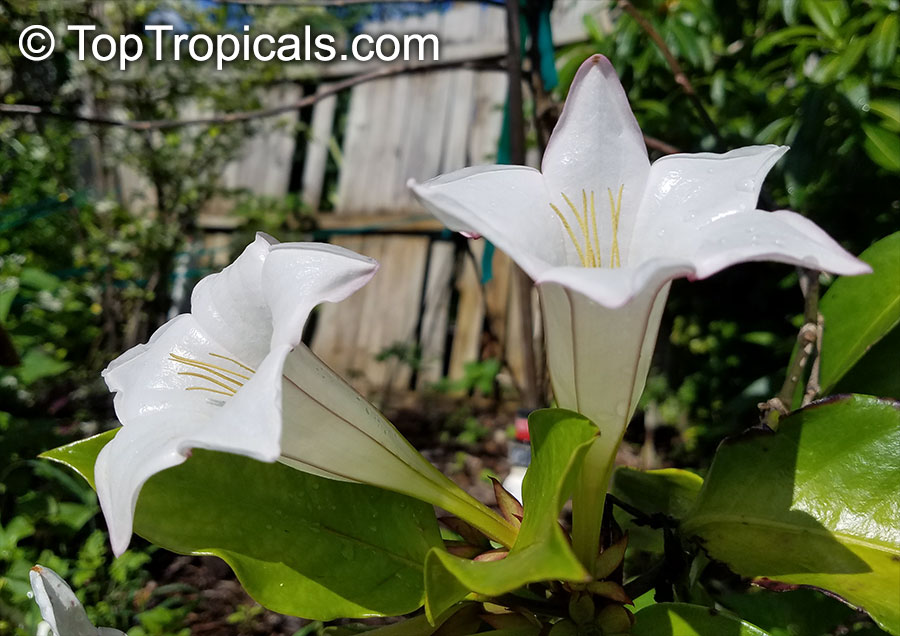
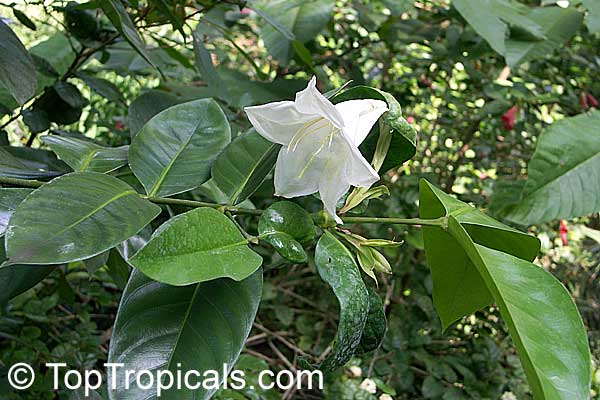
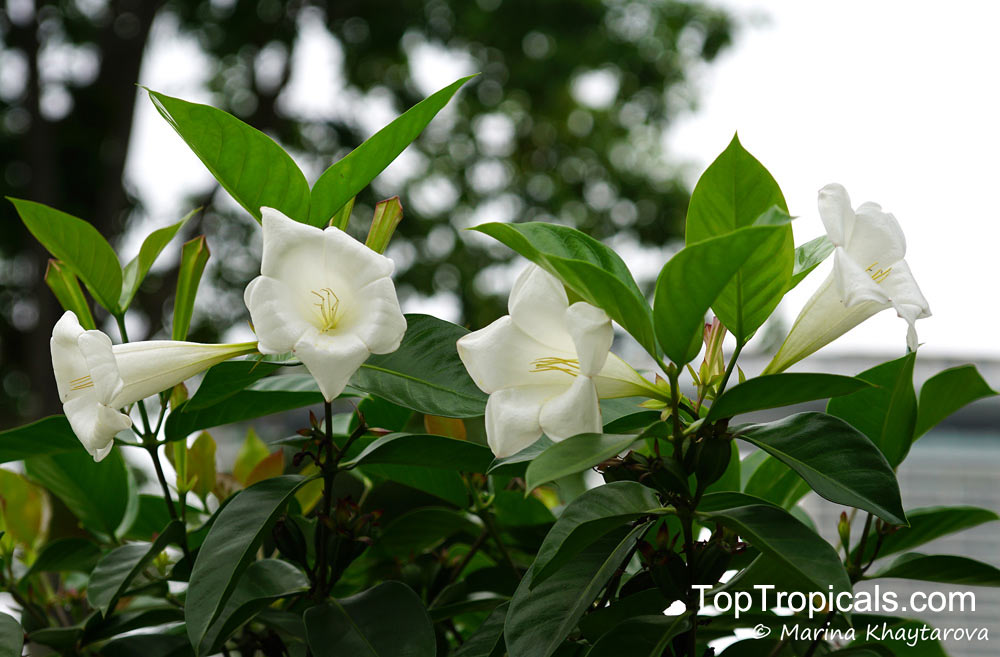
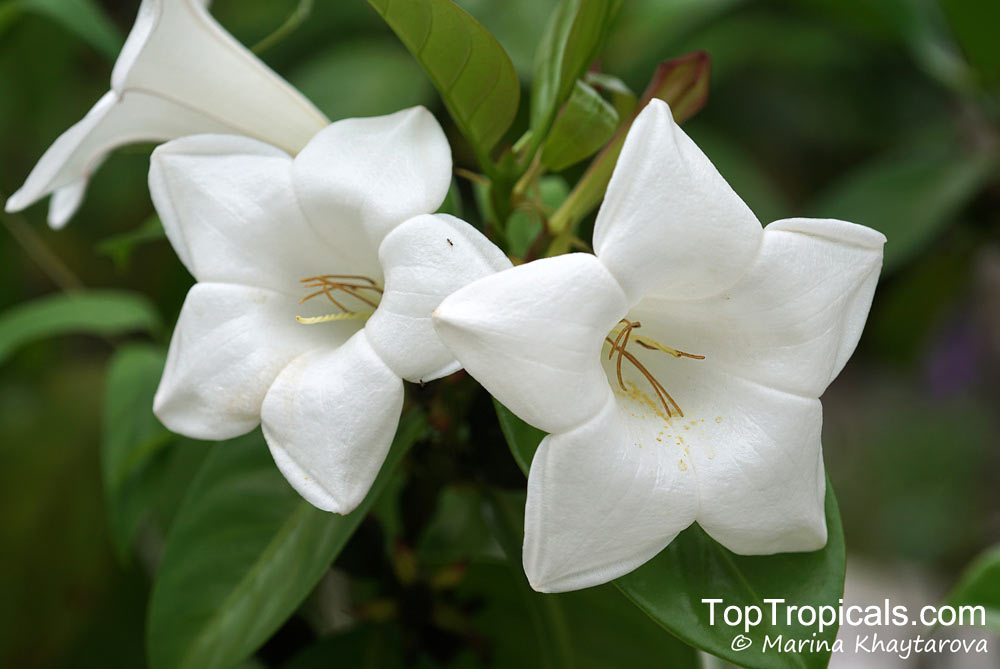
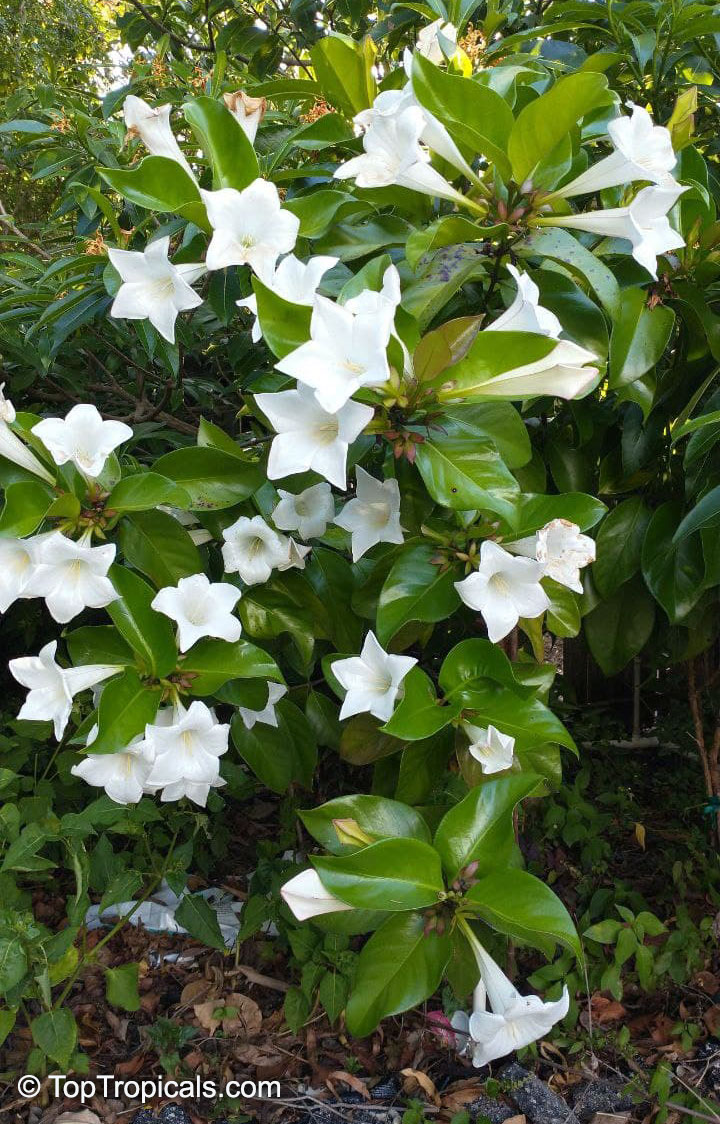
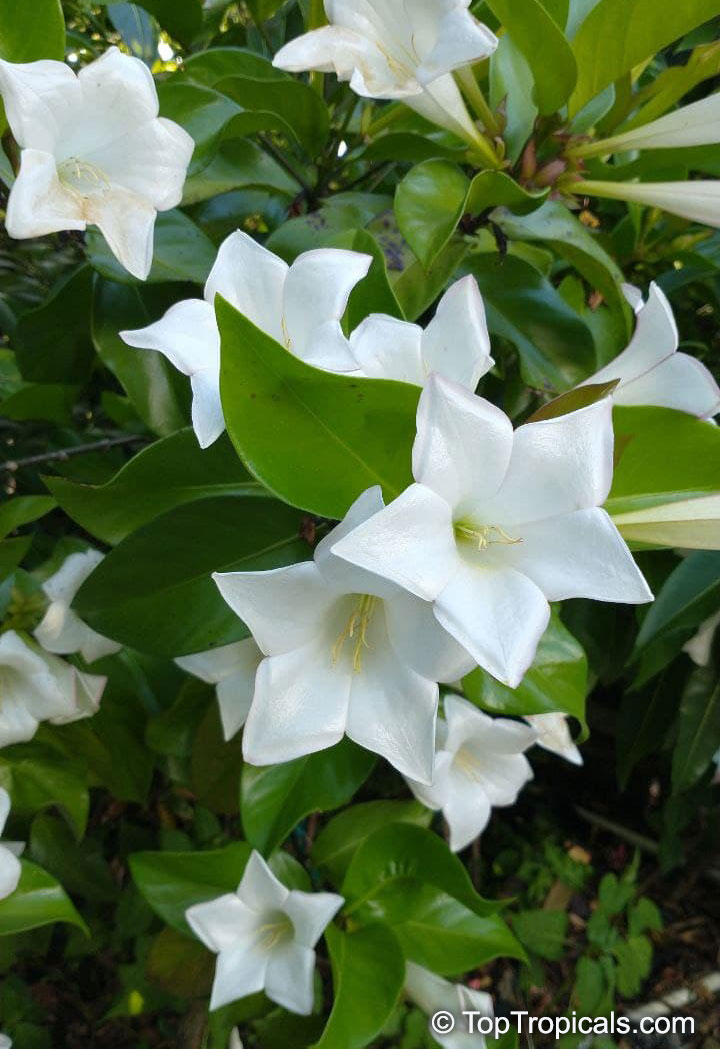
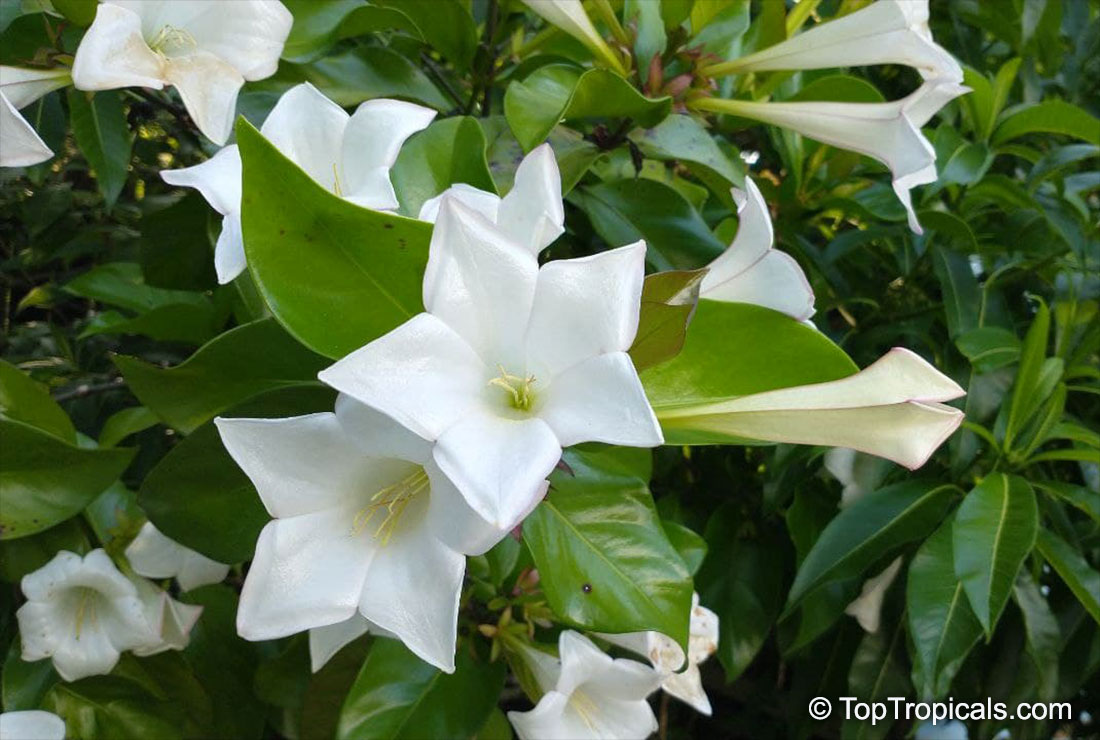
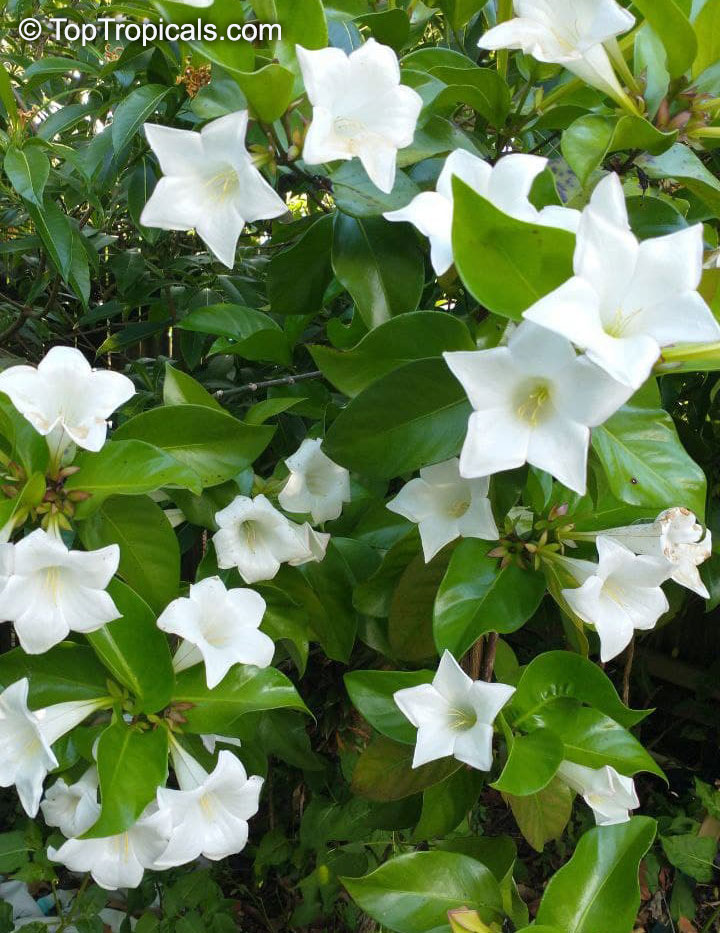
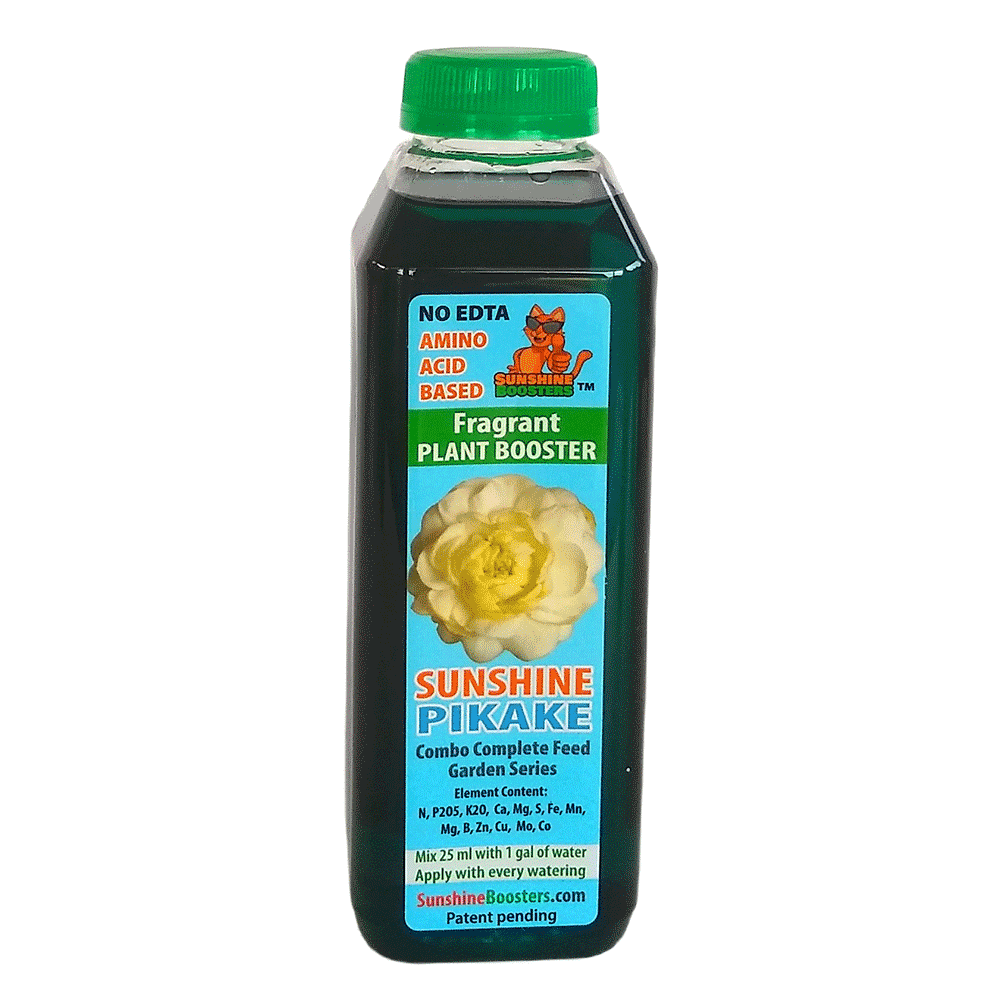 SUNSHINE Pikake (NPK 2-2-4) - eco-friendly concentrated nutrition booster for fragrant flowers. Improves quantity and quality of flowers. Encourages profuse blooming. Increases flower fragrance intensity. Can be used with every watering. For best results, use in combination with
SUNSHINE Pikake (NPK 2-2-4) - eco-friendly concentrated nutrition booster for fragrant flowers. Improves quantity and quality of flowers. Encourages profuse blooming. Increases flower fragrance intensity. Can be used with every watering. For best results, use in combination with 